KNEEL WITH POPE JOHN PAUL
General: That old people may be considered an asset to the spiritual and human growth of society.
Missionary: That in Africa authentic brotherly cooperation may develop among all those who work for the growth and development of ecclesial Communities.



WA’s only Catholic weekly newspaper
Perth: 16 September 2004 Price: $1
Justice for Romero
Salvadorans hope Romero case leads to reconciliation
By Ellie Hidalgo
Salvadorans expressed hope that a federal judge's ruling against a retired Salvadoran military officer in the assassination of Archbishop Oscar Romero will promote reconciliation and justice in their homeland.
"The truth has finally come out," said Eduardo Gonzalez, executive director of the Oscar Romero Clinic in Los Angeles.
"We're free of oppression, free from fear and free from the pain of not having had justice for so many years," Gonzalez said. "It's a historic day for peace and justice in El Salvador and the world. Now true reconciliation can begin."
"For nearly 25 years, it's been a wound in our lives. Today we will begin healing that," he said.
Gonzalez was among the 50 Salvadorans sitting on wooden courtroom benches on September 3 as Judge Oliver Wanger of the US District Court in Fresno ruled that Alvaro Saravia, a retired Salvadoran air force captain who had been living in Modesto, California, hired and paid the Archbishop's murderer.
In the civil suit, Saravia, whose current whereabouts are unknown, was ordered to pay US $10 million in damages to an unnamed relative of the Archbishop.
"Monsenor Romero - Presente!" cheered the Salvadorans who came from Fresno, Los Angeles, San Francisco and Chicago, after
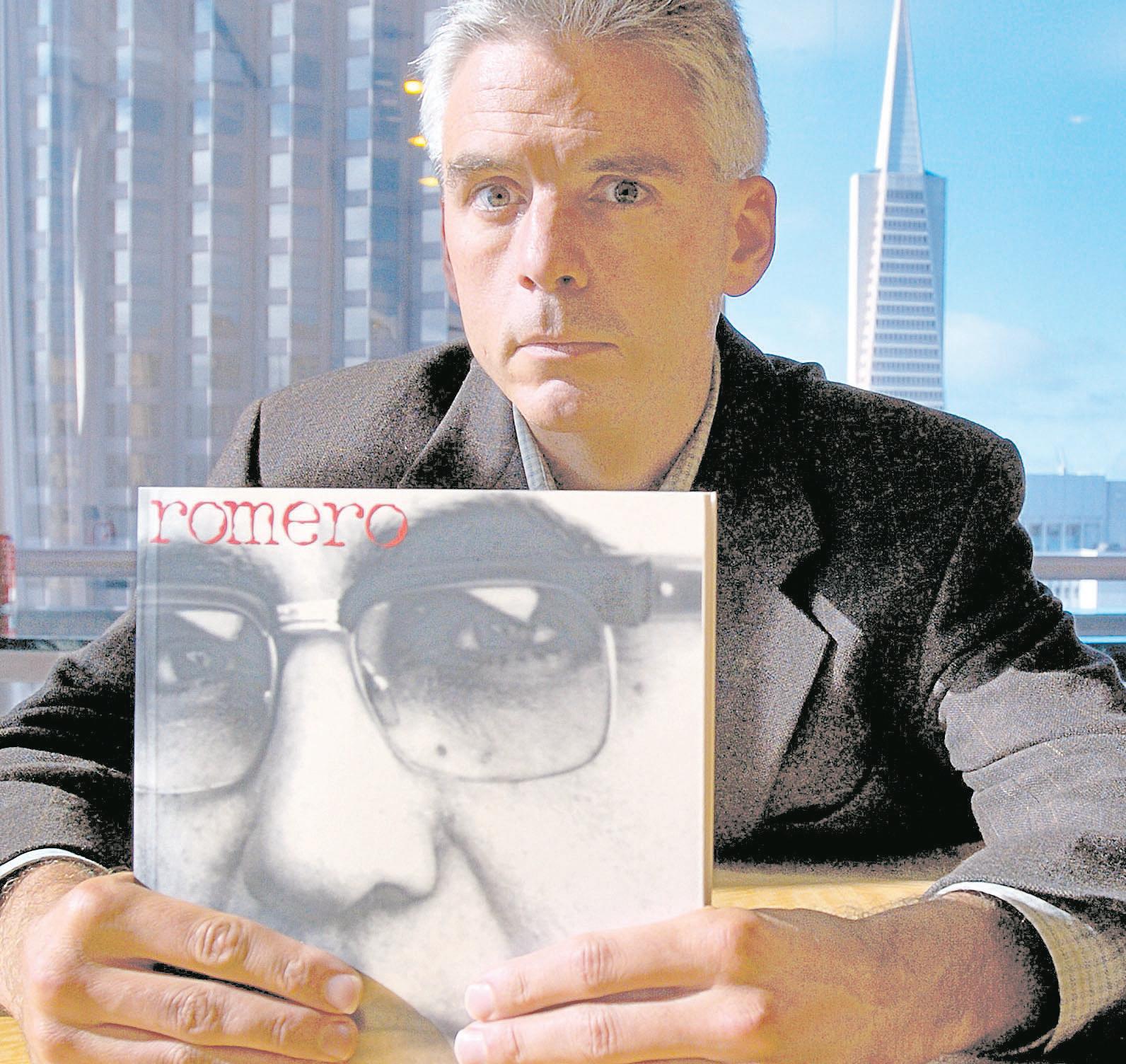
the decision was given. The cheer - Spanish for "Archbishop Romero is among us!" - referred to remarks by the Archbishop
that if killed he would be resurrected in the people.
The Archbishop, a strong critic of human rights abuses by the
Salvadoran military, was murdered in 1980 as a civil war was raging.
Continued page 3
Australian briefing leads world
COMMENT
By Fr Joe Parkinson
The Australian Catholic Church is a world leader when it comes to constructive collaboration between bishops, theologians and health care professionals.
At the official launch of the ‘Briefing Note on the Obligation to Provide Nutrition and Hydration’ in Adelaide last week, Bishop Michael Putney said that Australian Catholics had every right to be proud of the statement which is a joint publication of the Bishops Committee for Health Care, the Bishops Committee for Doctrine and Morals, and Catholic Health Australia.
No other country in the Englishspeaking world had managed to bring together such a wealth of learning and leadership to

Princess’s faith target of bigotry
There is still an anti-Catholic bias in Britain, according to Princess Michael of Kent, who claimed in late July that this is one of the reasons she has met hostility from the British public and in the media.
Her Catholicism was a problem when she married into the Royal family in 1978. Pressure was put on her at the time, she said, particularly by Lord Mountbatten, to convert to Anglicanism. She said there were even hints that she and her husband would be rewarded with a place on the Civil List if she converted. But she was not prepared to do so.
"To be asked to convert, to see the light, hallelujah, you know, I just can't do that," she told John Stapleton on ITV's My Favourite Hymns last Sunday. "I'm many things, but I'm not a hypocrite."
Princess Michael was primarily responding to reports that she had made racist remarks in a New York restaurant in May, which she denied. The Czech-born princess, originally Baroness Marie-Christine von Reibnitz, is the daughter of an Austrian father. “I’m foreign, which is never quite accepted, I think. I have different ways of saying things and doing things and I'm half Hungarian which implies I am volatile. Not really - I think I'm rather high-spirited. I'm also very tall. When I came into the family I was very much the tallest lady.
page 4
 Fr Joe Parkinson
Fr Joe Parkinson
explain in detail Pope John Paul II’s March 2004 address on the same subject.
Drafted jointly by Bishop Anthony Fisher OP, Rev Dr Gerald Gleeson and Dr Elizabeth Hepburn IBVM, the Briefing Note won the unanimous approval of both Bishops Committees and
would be welcomed in Catholic medical facilities around the world.
Speaking before nearly 450 delegates to Catholic Health Australia’s national conference last week, Bishop Fisher stated that CHA’s 2001 ‘Code of Ethical Standards’ would require no amendment because it clearly held the same position expressed in Pope John Paul’s address.
“Rather than the positions of those who say ‘always feed’, ‘never feed’ or ‘only in exceptional circumstances’, Pope John Paul proposes that feeding and hydrating, even by artificial means, is a kind of basic caring which should be given unless there are strong reasons against,” Bishop Fisher said.
But if death was imminent or the patient was in fact already dead,
or if nutrition and hydration were no longer able to sustain life, or if their mode of delivery proved unreasonably burdensome to the patient or their family, then the Pope’s teaching allowed that treatment could be withdrawn or, if not already commenced, it could be withheld.
This clear restatement of a traditional moral principle comes as Catholics in other countries continue to debate central aspects of the Pope’s March address, which had been prompted by increasing international trends favouring euthanasia.
Readers will recall last year’s Victoria Supreme Court ruling in the BWV case, which permitted the withdrawal of nutrition and hydration from an elderly woman suffering from Pick’s Disease.
Continued page 3
II IN PRAYER SEPTEMBER
Attorney Nicholas van Aelstyn, pictured in his office in San Francisco on August 20, holds a copy of a book on assassinated Salvadoran Archbishop Oscar Romero. Van Aelstyn has served as lead counsel in a case filed on behalf of the Archbishop’s family against members of a death squad that assassinated him as he celebrated Mass on March 24, 1980, in San Salvador.
Photo: CNS
Special Report STEPHEN STEELE reports direct form Chad Pages 7-10 Lockridge 10th! Celebration a real oldfashioned get-together Page 4 Charismatics 12,000 gather for Charismatic conference Page 13
Continued
Archbishop Carroll apologises to people with a disability who’ve felt excluded from the Church community
Australian Catholic Bishops Conference President, Archbishop Francis Carroll has expressed regret on behalf of the Church for any times that people with disability or their families have been made to feel unwelcome or left out of the Church community.
Archbishop Carroll made the apology in his homily at a Mass preceding the national launch of the pastoral document entitled, “I Have a Story – People with disability and their families participating fully in parish life”.
“I know there are many who have been deeply hurt and felt angered by their loved ones being overlooked, demeaned or rejected in different ways by the Church community,” he said.
“Today I wish to express regret for
such un-Christian behaviour, apologise to those who have experienced it and ask their pardon on behalf of the Church.”
Archbishop Carroll said the launch of “I Have a Story” was about making a fresh start “in being communities that respect the unique value of every person, include all in the life of the community and help liberate individuals and enrich the community itself by welcoming all”.
Following the Mass, at St Christopher’s Cathedral, Canberra, the Archbishop launched the document with Bishop Eugene Hurley, the chairman of the Bishops’ Committee for the Family and for Life.
It has been prepared by the Disability Working Party, convened by Trish and Glenn Mowbray in March 2002. Other members were Sr Jeanie Heininger sgs (Wollongong), Sr Veronica Hoey sgs (Melbourne) and Ms Trish Murdoch (Brisbane).
Sr Jeanie told those at the launch that “I Have a Story” was a document for the Common Good.
“And when something is written for the Common Good, it’s for everyone,” she said. “If we live our lives for the Common Good, we don’t worry about differences.”
Catharine Keir, who has Down Syndrome, said she loved going to Church and praying with her family and friends.
In characterising her experience of Church, Catharine said: “I don’t like being left out” and “I love Jesus”.
“Jesus walks beside me and He walks beside you too,” she said.
Dawn Kluck, who has

two children with disability also urged a Christ-centred response to people with disability.
”We must see Jesus in them and then we are called to act justly, love tenderly and walk humbly with them,” she said. “May we all treasure this document and use it diligently and fruitfully.”
Bishop Hurley said the document was not about doing the disabled a favour.
“It is to realise that the disabled are a gift to the parish family. We are incomplete without their participation and the challenge before us is to learn how to better invite and facilitate their participation,” he said.
“Then the parish family is enriched by the gifts of each other.”
A special message was read out at the launch from former deputy prime minister Tim Fischer, who’s son Harrison has autism.
Mr Fischer said Harrison had recently made his First Holy
Communion and that “the parameters of comfort afforded by his belief and religious understanding have greatly helped Harrison, and us, to tackle the many challenges of living with a disability”.
The launch was chaired by Glenn and Trish Mowbray who said that in preparing the document, consultation was undertaken last year in every state and territory.
People with a disability, their families and friends were surveyed on how parishes can promote participation – what barriers exist and good news stories that demonstrate active participation in parish life.
The booklets were collated and packed by students with disability from the Black Mountain School in Canberra and have been sent to every parish in the country.
An electronic version of the document and an order form for the printed booklet, as well as versions in Braille, large print and audio cassette are available at www.acbc. catholic.org.au.


The Record 2 16 SEPTEMBER 2004 No. 4020 DISTRIBUTION The Record, established in 1874, is distributed to Catholic Churches, presbyteries, religious houses and subscribers throughout the Archdiocese of Perth, Geraldton, Bunbury, Broome and overseas. THE TEAM Managing Editor Peter Rosengren Production/ Advertising Carole McMillen Office Manager Kylie Waddell JOURNALISTS Bronwen Clune Jamie O’Brien CONTRIBUTORS Hugh Ryan, Paul Gray, Fr Tim Deeter, Tony Evans, George Russo, Peter Dwan, Norma Woodcock, Guy Crouchback SUBSCRIPTIONS Subscribe to The Record (46 issues) and Discovery (6 issues) $55 per year. Send subscription with cheque or money order. ADVERTISING Editorial: Tuesday first mail Advertising: Booking: Monday midday Copy: Tuesday midday CONTACT US 587 Newcastle Street, West Perth, WA 6005 PO Box 75, Leederville, WA 6902 Tel. 9227 7080 Fax 9227 7087 or find us on the web www.therecord.com.au Editor cathrec@iinet. net.au Classifieds/ Advertising advertising@ therecord.com.au Accounts administration@ therecord.com.au Why not stay at STORMANSTON HOUSE 27 McLaren Street, North Sydney Restful & secure accommodation operated by the Sisters of Mercy, North Sydney. • Situated in the heart of North Sydney and short distance to the city • Rooms available with ensuite facility • Continental breakfast, tea/coffee making facilities & television • Separate lounge/dining room, kitchen & laundry • Private off-street parking Contact: Phone: 0418 650 661 or email: nsstorm@tpg.com.au VISITING SYDNEY MANNING & ASSOCIATES OPTOMETRISTS Contact Lens Consultants Mark Kalnenas (B. optom) Grove Plaza, Cottesloe 9384 6720 A LIFE OF PRAYER ... are you called to the Benedictine life of divine praise and eucharistic prayer for the Church? Contact the: Rev Mother Cyril, OSB, Tyburn Priory, 325 Garfield Road, Riverstone, NSW 2765 www.tyburnconvent.org.uk TYBURN NUNS www. TIMOR GAS TREATY save east timor A FAIR GO FOR EAST TIMOR .org You’re welcome here
On Silent Wings Chief among the seven archangels are Michael, Gabriel and Raphael. The Church marks a feast in their names on September 29. CNS graphic by Anthony DeFeo Perhaps this feast is a good time to teach your children or grandchildren the prayers to their Guardian Angel. 200 St.George’s Terrace,Perth WA 6000 Email:admin@flightworld.com.au Travel Services Lic No.9TA796 Italian Holiday FOR ALL THINGS ROMAN * Meet & Greet * Boutique Hotels * B&B * Country or City Villas * Monastery/Convent Accommodation * Theatre/Language Assistance * Restaurants * Private Car Touring Contact Michael or Sabina (08) 9322 2914 Italian Holiday YOUR
“I want to ring the bell,” answered one man with a disability when asked what he hoped for and wanted from his parish community. Pictured is Paul Ross of Canberra enthusiastically ringing a bell at the launch of “I Have a Story”. With him is Sr Jeanie Heininger.
Pope: increase lay participation
Pope urges US bishops to have collaborative style of governance
In the wake of the sex abuse scandal, US bishops should be open to a more collaborative style of governance that shares responsibility with lay Catholics, Pope John Paul II said.
A consultative approach should not be seen as an abandonment of episcopal authority or a concession to democracy, but as a necessary way of strengthening a bishop's effectiveness, the Pope said.
He made the remarks on September 11 in a talk to more than 30 bishops on their "ad limina" visits to the Vatican.
The Pope's theme was episcopal governance, and he said he wanted to explore it in the context of the sex abuse crisis. He said many of the bishops had spoken to him of a "crisis of confidence" in Church leadership provoked by the abuse scandals and about the general call for accountability in the church's governance on every level. The Pope said the bishops should be willing to critique certain styles of governance that, in the name of efficient

administration, "can run the risk of distancing the pastor from the members of his flock."
He recalled that the 2001 Synod of Bishops had acknowledged the need for each bishop to "develop a pastoral style which is ever more open to collaboration with all." Although bishops remain responsible for making authoritative decisions, this presupposes participation in decision-making by "every category of the faithful," he said. The commitment
to creating better structures of participation, consultation and shared responsibility "should not be misunderstood as a concession to a secular 'democratic' model of governance," but as a necessary way of exercising and strengthening a bishop's authority, he said. Ultimately, he said, episcopal authority rests on a bishop's role as a witness, a teacher and a model of holiness, as well as a prudent administrator of the
Church's goods. "Bishops need to be esteemed as successors of the apostles not only in authority and sacred power, but above all by their apostolic life and witness," he said.
The Pope said bishops should also remember that the apostolic authority they exercise is a form of service, inspired by and modeled on the service of Christ, who washed the feet of his disciples.
Repeating the encouragement he has offered other groups of US bishops throughout the year, the Pope said he was convinced the bishops could help lead the church in the United States through a period of renewal after the sex abuse crisis.
Throughout history, good governance by bishops has helped the church "preserve her integrity, independence and fidelity to the Gospel in the face of threats from within and without," the Pope said.
"I am convinced that today, as
Justice for slain Archbishop
Continued from page 1
Neris Gonzalez, once a catechist in El Salvador, showed the scars on her right arm from cigarette burns by members of the national guard when she was 22. She retold the story of being raped repeatedly for two weeks in 1979, leading to the death of the 8-month-old baby in her womb.
"We are not ignorant," said the Chicago resident. "Peace comes with justice."
Nuvia Magana, community centre coordinator at the Romero clinic, said listening to the witnesses awakened piercing memories.
The victims of the abuses "were our friends, brothers, sisters, cousins, parents," said Magana, whose brother survived being tortured by police.
Nancy Spear, a member of the PicoUnion Shalom Ministry of the United Methodist Church, said the case also provides an opportunity to reflect on U.S. policy at the time, when the United
States gave billions of dollars in aid to the Salvadoran government.
"It's difficult to feel that my country has been a part of something that is now being labeled a crime against humanity," she said.
Others lamented that Saravia could not be tried in El Salvador given a sweeping amnesty law that exempts anyone who participated in political crimes before 1993.
"Salvadoran judges can find strength in this ruling," said Carlos Mauricio, who survived capture by an army death squad in 1983 and now lives in San Francisco.
In El Salvador, Maria Julia Hernandez, head of the San Salvador archdiocesan human rights office, asked on Sept. 7 that the Archbishop's case be reopened in El Salvador in light of Wanger's ruling. Hernandez testified at the Fresno hearing.
Archbishop Romero's death had
far-reaching consequences, testified political science and Latin American studies professor Terry Lynn Karl of Stanford University during the hearing.
Karl said Archbishop Romero had served as a bridge builder between the moderate right and the moderate left. His death left a significant void and military hardliners ousted more moderate military forces and began to kill civilians with suspected leftist ties in much greater numbers, she said.
What happened in El Salvador, said Karl, "is one of the most egregious examples of state terror in the history of Latin America."
The suit against Saravia was filed by the San Francisco-based Center for Justice and Accountability and the San Francisco law firm of Heller Ehrman White & McAuliffe. Two U.S. laws make it possible to file civil suits against foreignborn U.S. residents accused of human rights violations committed abroad.
Australian briefing is a leader for world
Continued from page 1
The BWV case made international headlines because it raised once again the spectre of euthanasia: withdrawing a life-sustaining treatment so that the patient will die sooner rather than later.
Even in palliative care, when all hope of cure has gone and the focus is on keeping a patient pain-free and comfortable, it is never acceptable to deliver or withhold a treatment with the intention of shortening the patient’s life.
But if treatments required to preserve a dying patient’s life mean seriously compromising his or her comfort, then in a particular case it might be appropriate to withhold or withdraw those treatments.
Dr Gleeson warned that Catholics must not take ‘short cuts’ when thinking through difficult moral problems such as these.
“The first ‘short cut’ is to suppose that the unresponsive state of itself alters the kind of obligation there is to preserve a person’s life,” Dr Gleeson said.
A second ‘short cut’ was the assumption that any medical treatment could be refused simply because it was ‘medical’ or ‘technical’ in nature.
“The Pope holds that there should be a presumption, in principle, that all patients be given food and water - if necessary through tubes - unless and until this is not effective and/or unduly burdensome,” Dr Gleeson said.
It is most important to assess the actual meaning of a particular treatment in the context of all relevant factors, including the patient’s physical, psychological and spiritual health and the likely benefit or burden of the treatment and its consequences.
Difficult moral questions can only be
resolved by making a balanced, careful and thorough assessment in each individual case.
In fulfilling this serious duty, Catholics enjoy the advantage of a long and rich tradition of moral thought and teaching.
The Briefing Note adds to this tradition. It will be of enormous benefit to health and allied professionals, and will be welcomed by all Catholics as another sign of the Church’s strong commitment to proclaim the Gospel of Life.
Further reports on the CHA conference will appear in coming weeks. Copies of the Briefing Note are available from the L J Goody Bioethics Centre, 39 Jugan Street, Glendalough 6016.
It can also be downloaded from the Australian Catholic Bishops’ website at: www.acbc.catholic.org.au/whatsnew/ index.htm
at every critical moment in her history, the Church will find the resources for an authentic selfrenewal in the wisdom, vision and zeal of bishops outstanding for their holiness," he said.
But the challenges posed by the scandal go beyond the bishops.
"The painful period of selfexamination provoked by the events of the past two years will bear spiritual fruit only if it leads the whole Catholic community in America to a deeper understanding of the Church's authentic nature and mission and a more intense commitment to making the church in your country reflect, in every aspect of her life, the light of Christ's grace and truth," he said.

ST VINCENT DE PAUL SOCIETY (WA) INCORPORATED
PERSONAL ASSISTANT TO THE STATE PRESIDENT AND CHIEF EXECUTIVE OFFICER
(Full-time, permanent position)
A newly created position exists for a high level, experienced Personal Assistant to provide administrative and personal support through secretarial duties, including diary management and travel arrangements.
High level communication skills are required to liaise effectively with Government Departments, other community organisations, media, general public, members, volunteers and employed staff. Equally important are high level written skills for the preparation of agenda, minutes and reports as well as undertaking research activities for selected community projects.
It is expected that applicants, with strong computer skills, will be able to achieve objectives within a set timeframe, with discretion, initiative and confidentiality.
Applicants, supportive of the Ethos of the Society, will need a background in a similar role and a proven track record in supporting senior executives.
Located in Belmont, the Society is an equal opportunity employer and is committed to providing a safe working environment.
Written applications to Chief Executive Officer, PO Box 473, Belmont WA 6984 or email to alan. jennings@svdpwa.org.au by 30th September, 2004.






17 Angelico Street, Woodlands
Tel: 9446 2055
- 2004
Sunday 10th October 10.00 am
The priests and Brothers of the Dominican Order invite all former parishioners of Innaloo and Doubleview to join present day parishioners of both parishes and the Dominican Sisters to celebrate the Golden Jubilee of the first foundation of the Dominican Friars in the Archdiocese of Perth in 1954. The Mass will be concelebrated by Bishop Sproxton and the Dominican Prior Provincial together with all the former Parish Priests who are still alive. The Mass will be followed by a catered gathering in and around the Parish Hall.
The Record 16 SEPTEMBER 2004 3
GOLDEN JUBILEE FOUNDATION OF DOMINICAN FRIARS IN PERTH 1954
Pope John Paul II addresses a delegation of more than 30 US bishops from the USA at Castel Gandolfo, Italy, on September 11. Photo: CNS
AN
INVITATION
Lockridge sends birthday gift
Considering how to celebrate its 10th anniversary, Lockridge parish decided to help a struggling parish in PNG
Sunday, 5 September saw the tenth anniversary of the dedication of the Good Shepherd Church at Lockridge.
Parishioners wanted to make a statement about what their Church building stood for. It stood as a symbol of many things, but most of all it made an honest statement about the kind of people who gathered to worship within its boundaries and the faith that they followed.
In his homily, Archbishop Barry Hickey said that the hallowed grounds of the Church were made holier because of the prayers offered by the parishioners over the 10 years of worship at the Church.
However, Parishioners led by the Council, wanted to go one step further. Taking the words of St James (2:26 "For just as a body without a spirit is dead, so also faith without works is dead") as their inspiration, the Parish set turn words into actions.
The Council decided it should help a community which is in need of funds to build a Church building of their own.
With the help of Francis Leong, the Perth archdiocesan Director of Catholic Mission, Perth, Lockridge set out to help the parish of Arop2 at Aitape in Papua New Guinea.
The PNG parish was struck by the tsunami in 1998 and nine churches in the diocese were lost.
Between January and August this year, several fund-raising activities were undertaken. Activities were organised to raise money, eith an emphasis on helping the PNG parish to build its community as well. As a result, Mr Leong was presented with a cheque for $20 000 which was to be forwarded to the Diocese of Aitape for their church in Arop2.
In addition, parishioners were also treated to a slide presentation of the building of
Princess’s faith Princess’s the problem the
Continued from page 1
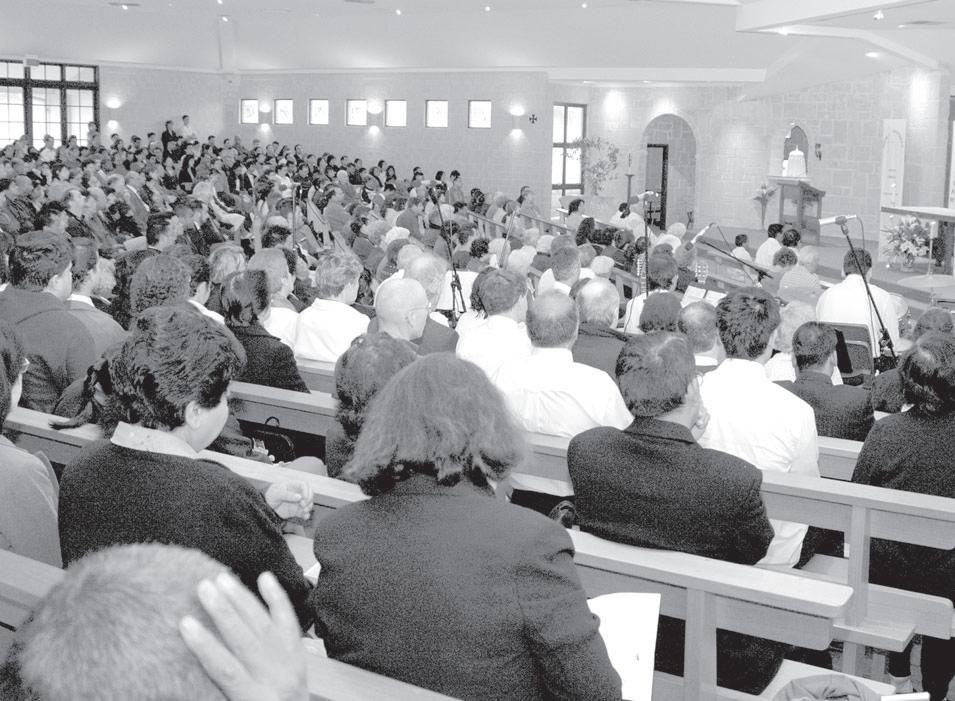

the church – from the surveying stage to the dedication Mass. This was followed by a presentation on the progress of the building of the Church at Arop2. During the Lockridge Mass both Archbishop Hickey and Mr Leong referred to a letter received from Bishop Austin Crapp ofm, Bishop of Aitape.
Bishop Crapp "gave thanks for the spirit of love and compassion, which the Spirit of God has placed in (the) holy people of Good Shepherd.” He also mentioned that on that Sunday, he would be in the US state of Milwaukee, "preaching on the need to build nine churches in the tsunami area of Aitape."
He continued, "I shall be very conscious that you are doing more than your share to build one of them and I shall use your good example in my homily to the people of Milwaukee and shall challenge them to match your wonderful generosity."
“Thank God, Diana came and was tall with me." Prince Michael of Kent lost his right of succession to the throne when he married Princess Michael. Their marriage was doubly controversial because her previous marriage had been annulled. According to the Act of Settlement of 1701, no Catholic can accede to the throne and nobody in line can remain in succession if he or she becomes or marries a Catholic.
Their nephew Lord Nicholas Windsor, the younger son of the Duke and Duchess of Kent, forfeited his 25th place in line to the throne when he converted to Catholicism in 2002. His brother George, Earl of St Andrews, was also ruled out of the line of succession when he married Silvana Tomaselli, a Canadian academic who is a Catholic, in 1988.
The Duchess of Kent herself became a Catholic in 1994. The Act of Settlement prevents monarchs or heirs to the throne from marrying Catholics, but their spouses are not prevented from converting to Catholicism after their marriages.
There have been a number of challenges to the Act of Settlement, on the grounds that it discriminates specifically against Catholics. There is no restriction on the monarch or any person in line to the throne marrying a member of any other religion. The Guardian newspaper lost a legal challenge against the Act, based on humans rights legislation.
Fear grows
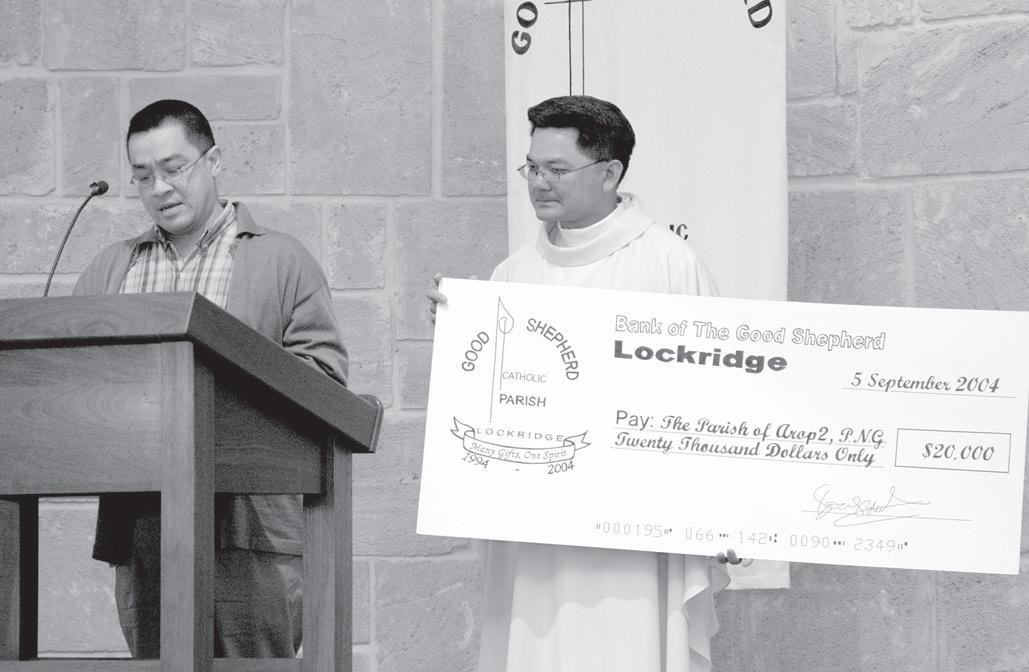
News Brief
A Vatican cardinal warned that increasing acts of global terrorism are destroying modern society and provoking a widespread state of fear. "It's painful to say this, but terrorism -- especially terrorism that seeks

an exploitative and inconsistent justification in religion - is beginning to condition our lives and our society. It is destroying the bodies of individuals and the body of society," Cardinal Achille Silvestrini said Sept. 10. The cardinal, who once served as the Vatican's top foreign affairs official, spoke at an interreligious conference in the central
Italian monastery town of Camaldoli. He was one of several speakers who voiced alarm at the escalating incidence and brutality of terrorism. The whole world seems caught up in "a new, huge wave of hatred," Cardinal Silvestrini said. "In the face of terror that humiliates human lives, fear dictates new rules of living," he said.
The Record 4 16 SEPTEMBER 2004 Chapels located at: Cannington: 9461 7133 Cottesloe: 9384 2226 Dianella: 9229 7700 Fremantle: 9239 7744 Mandurah: 9535 4261 Medina: 9236 7733 Midland: 9229 7255 Perth: 9231 5199 Westminster 9464 7266 Generations of understanding. For information on pre-paid funerals, memorial selections or female funeral directors, please call any of our local offices. Simply a matter of trust since 1888 MJB&B BOD 45597B
Some of the hundreds, above, who turned out for Lockridge's celebrations on September 5. Afterwards, Archbishop Barry Hickey, parish priest Fr Vinh Dong and children of the parish cut the birthday cake. At the anniversary Mass, below, Perth Catholic Mission director Francis Leong was presented with a cheque for the parish of Arop2 in Papua New Guinea, hit by a devastating tidal wave in 1998, and still engaged in rebuilding itself.
& Opinion

opinions from around Australia
Bouquet for Father
Archbishop Barry Hickey has warmly praised Maylands parish priest Father Maurice Toop, who celebrated the 50th anniversary of his ordination last weekend.
He said that Father Maurice had “humbly, fully and wonderfully” fulfilled his vocation, and that he had been a model for other priests to emulate.
The Archbishop presided over a big contingent of clergy, parishoners, relations and friends at a celebratory Mass at Maylands’ Our Lady Queen of Martyrs Church.
His Grace described how he had followed Father Maurice at both St Brigid’s (West Perth) and Sacred Heart (Highgate) as a young priest, only to hear many parishoners say: “Oh I wish they hadn’t taken Father Toop away.”
Father Maurice offered last week’s special Mass for the late Archbishop William Foley, who was ordained with him by then Bishop Launcelot Goody at the Holy Rosary Church, Nedlands, on September 12, 1954. Father Maurice, who had attended St Theresa’s School in Nedlands, later studied with Archbishop Foley at St Charles’ Seminary in Guildford and the Collegio Brignole Sale in Genoa.
The Italian experience served him well at St Brigid’s, which was known by many at the time as “Little Italy”. It was a time of mass migration, and many new arrivals went straight to the area after arriving on the ship at Fremantle.
Father Maurice has spent 23 years in country parishes including 14 years on the Goldfields. For much of this time he was working with the displaced Aboriginal people living on the outskirts of Kalgoorlie and Boulder.
Appointed to St Kieran’s in Osborne Park in 1979, he oversaw the building of
For thoughtful browsers
Ignatius Press has launched a new online journal of culture, theology and news that will allow readers to communicate directly with the publishing house's authors.
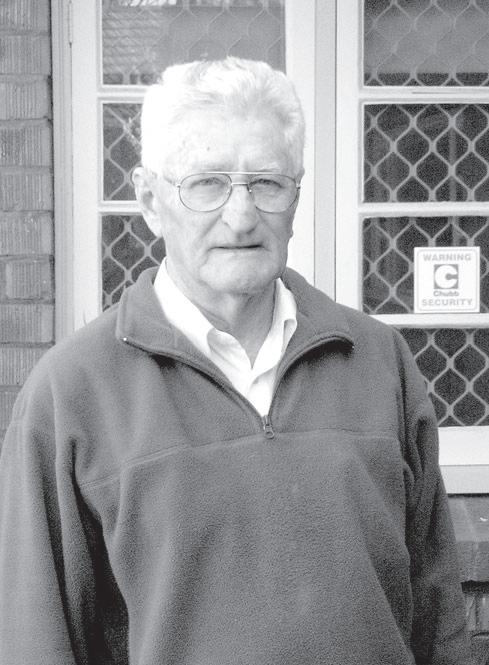
the new parish church. After five years he was off to Meekatharra, and later Port Hedland, Laverton and Northam, before another term at Highgate, and then to Maylands.
Father Maurice said a major influence during his priesthood had been the Second Vatican Council in the 1960s. This had promoted a renewed thirst for the Scriptures, a renewal of Church liturgy, and a call to Catholics not to become detached from the modern world.
This required Catholics to recognise and acknowledge the truth, wherever it might be found.
The children of the Maylands parish presented Father Maurice with a spiritual bouquet, in recognition of his selfless approach to serving their community.
News Brief
IgnatiusInsight.com edited and produced by convert author and Catholic apologist Carl Olson is billed as a Web site "for the thoughtful Catholic reader."
"We want to provide Catholic readers with a Web site where they can read insightful, informa-
tive articles, interviews and reviews, knowing that the Ignatius Press authors are orthodox and proud of it," Olson said. The Web site, at www.ignatiusinsight.com, also links to the new Insight Scoop blog, which may be accessed directly at: http://insightscoop.typepad.com.
Clergy appointments
Fr Clesio Mendes has been appointed Assistant Priest in the Parish of Cottesloe from Friday 1 October 2004.
Fr Giosue Marini will soon be leaving the Cottesloe parish to take up stud-
ies overseas for a Theological Degree. Fr Richard Tomelty, Assistant Priest at St Mary’s Cathedral, will be taking up the appointment of Assistant Priest at Kelmscott from 1 October 2004

Alexander Downer must now take the lead in fighting the war on terror, at the Australian end.
The bombing of the Australian embassy in Jakarta is a tragedy of huge significance for the Australian nation.
It’s also an enormous tragedy for our Indonesian brothers and sisters, who bore the brunt of the car bomb blast on a busy Jakarta street.
But this bomb blast places enormous new responsibilities on the shoulders of our nation’s political leaders.
No-one, more so than Foreign Minister Downer. I say Mr Downer must step forward and take responsibility for two reasons.
One is that Alexander Downer is, personally, up to it.
The second is that the growing challenge of terrorism is fundamentally a foreign policy challenge for Australia – not a challenge to increase our own security measures, under the guidance of old-fashioned politicians like AttorneyGeneral Philip Ruddock.
No Australian leader –indeed, few political leaders anywhere in the Western world since September 11, 2001 – has shown the same intellectual understanding of the real challenge laid down by terrorism as that shown by Mr Downer.
His speeches and recent White Paper on terrorism demonstrate that the Foreign Minister knows all too well what many less informed commentators on terrorism – including some on his own side of politics - fail to understand.
Namely, that people who use such cowardly “military” tactics as the bombing of civilian targets and the murder of women, children and moderate opponents are not in any way related to the mainstream of the Muslim religion.
They have much more in
common with Communists, Leninists, Nazis and the Maoist terrorists who wrought such enormous havoc on the lives of innocent people throughout the 20th century.
The terrorists must be opposed not just by beefing up the table-thumping rhetoric about how evil these obviously evil people are.
They must be opposed not just by hairy-chest acts: toughening up security measures like the strengthening of ASIO powers and the boosting of security controls at airports.
These measures have their place. But as the Jakarta bombing reminds us tragically, they’re never going to be enough.
Australia, under the passionate but sometimes unwise leadership of the Howard Government, has thrown enormous energy into tightening those security measures over the past three years.
It has also supported America’s get-tough military policy in Iraq. None of this get-tough thinking has made Australia, or Australians, any safer from attack by terrorist extremists than we were before.
That shouldn’t be a surprise to any intelligent person – because the roots of the problem don’t lie in our own lack of preparedness for being attacked.
They lie in the fact that a growing number of people on the fringes of the “Islamic” world want to attack, kill and destroy all those who lie in the path of their own desire to rule the world, and re-make it in their own image.
That means they want to kill Muslims, as well as Westerners. It’s why so many Muslims have already died as victims of the terrorists’ so-called war against the West.
It’s why the victims of the Jakarta bombing - though it was an attack nominally aimed at Australia - were, indeed, mainly Indonesian
with Paul Gray
Muslims. Since September 11 and Bali we have spent too long looking to the leadership of “get tough” politicians like AttorneyGeneral Ruddock to solve these problems.
In fact, the only answer to the growing threat from terrorism lies in mounting a more effective foreign affairs strategy.
We must counter the claims of the extremists within Islamic countries like Indonesia, Pakistan and Saudi Arabia. To do this, we must build stronger alliances with moderate political groups and leaders within Islamic countries.
We must also do everything in our power – much more than we are presently doing – to deliberately set about fostering the growth of a prosperous, economically independent middle class in Muslim countries. Most of them, today, lack this.
We must also continue to use force, where appropriate, to destroy people and groups who are, in fact if not in name, enemy combatants against Australia.
Above all, we must begin to think in terms of propaganda – influencing opinion within Muslim countries, to make them more clearly understand that the West is not their enemy, but their friend. Their enemies are not Australians, but the people who continue to kill them, as those who died in the Jakarta bombing were killed.
Shadow Foreign Minister Kevin Rudd may also well understand these crucial issues. But does his leader, Mark Latham?
Alexander Downer, if not John Howard, does understand these central questions. And unlike Mr Rudd, he may have enough standing within the next Australian government to influence his leader’s thinking. Mr Downer must rise to the challenge.
23 & 24 Confirmation, DianellaMgr Peter McCrann
24
Mercedes
Reflection
I Say, I Say......
official diary
17 Opening and Blessing of extensions at John Paul College, Kalgoorlie and presentation of Youth Books to Yr 12s - Bishop Sproxton Blessing of St Mary’s Industries, Kalgoorlie - Bishop Sproxton 17-19 Parish Visitation and Confirmation, Lesmurdie - Archbishop Hickey 18 Candidacy for St Charles’ Seminarians at Good Shepherd Church, Lockridge - Bishop Sproxton 19 Confirmation, Catholic Agricultural College - Bishop Sproxton Confirmation, Gosnells - Bishop Quinn Mass for Feast of Maria SS Addolorata, Dianella - Bishop Quinn 20-22 National Commission for Clergy Life and Ministry, CanberraBishop Sproxton 21 Mass for Divine Will Conference, Spearwood - Archbishop Hickey 22 Meet with Confirmation candidates, St Maria Gorretti, Redcliffe - Archbishop Hickey Evening with Acolytes, Catholic Pastoral Centre, HighgateArchbishop Hickey Confirmation, WannerooFr Greg Carroll 23 Mass and Awards Ceremony for MercyCare, McAuley Chapel, Wembley - Archbishop Hickey Sundowner to launch new Archdiocesan Integrated Marriage Preparation and Education Program - Archbishop Hickey Padre Pio Mass and Blessing, Balcatta - Archbishop Hickey Opening and Blessing of extensions at St Munchin’s Primary School,
September
Gosnells - Bishop Sproxton
Mercy Day Mass for
College, St Mary’s CathedralArchbishop Hickey Ordination to Diaconate for St Charles’ Seminarians, 7 pm St Mary’s Cathedral - Archbishop Hickey, Bishop Sproxton
Semi-centenarian priest: Fr Maurice Toop
The Record 16 SEPTEMBER 2004 5
Guidelines
Iwas especially pleased to see two items in this week’s Record.
One was the letter pointing to reasons why the description of Fr. Richard McBrien as being “not noted for his orthodoxy” is entirely justifiable, even though he has not been excommunicated. The other was the excellent article by Richard Egan giving guiding principles as to which candidates to vote for in the forthcoming election.
As he says, not all issues are of equal importance when coming to vote. It is particularly interesting that “Catholic Answers” in America has promulgated a similar guide for American voters, given that one of the Presidential candidates, John Kerry, claims to be a Catholic and claims to be”personally opposed to abortion” and yet has consistently voted for every piece of legislation favouring abortion. When President Bush tried to outlaw partial birth abortions, Kerry voted to overturn the President’ s ban. So noted is his voting record on this matter that several of the American bishops h ave publicly stated that they would deny him Communion if he presented himself to them for the reception of this Sacrament.
This has also brought Cardinal Ratzinger to write to Cardinal
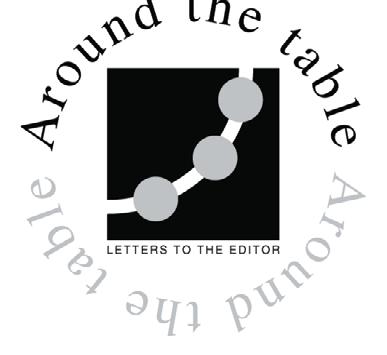
McCarrick of the US bishops conference on this matter. Inter alia he writes “When a Catholic does not share a candidate’s stand in favour of abortion and/ or euthanasia, but votes for that candidate for other reasons, it is considered remote material cooperation, which can be permitted in the presence of proportionate reasons”. However, in a footnote, he makes it clear that he cannot see any such proportionate reasons in this case. Archbishop Burke of St. Louis added “What is a proportionate reason to justify favouring the taking of an innocent, defenceless human life?
And I just leave that to you as a question. That‚s the question that has to be answered in your conscience.
What is the proportionate reason?” Previously, Archbishop Burke had said that to vote for a candidate who was pro-abortion, is a grave sin.
I wonder just how many Catholics enter the voting booth with an informed conscience! I know that I will not be able to vote for the incumbent of my electorate given that he even threatened to cross the floor and vote against Tony Abbott’s attempts to have parents informed when their schoolgirl daughters seek an abortion without their parents knowing. He claimed that it was a breech of doctor/patient confidentiality!
John Rayner
Hillarys
A real life
Recent surveys cast disturbing light on how IVF clinics dispose of embryos. Some freeze “spare” embryos indefinitely. Others give them a funeral. Some simply incinerate them. Most embryos go to research institutions. Only 3% of clinics avoid creating surplus embryos. The British Fertility Society says: “The use of human embryos is a sensitive area. They do represent a life. It’s important to have a regulatory framework giving clear guidelines.” But Alison Davis from the disability rights group No Less Human, says: ”It’s not enough to say embryos “represent’ a life. Each embryo IS a human individual, with the same right to life as any other member of the human race.
It’s impossible to adequately
‘regulate’ the creation of human embryos in this way. It should be banned.” She’s right, isn’t she? (source: Bio Edge website, 3 September 2004)
Mr A Jago Mildura, Vic
Almost forgotten
The large number of the courageous, socially and morally right minded candidates of the Christian Democratic Party in the next Federal Election must be bitterly disappointed with the full page article. “Life Issues and the Ballot Box”(9 September)
At great cost the CDP has a team of three Senate candidates and has endorsed candidates in every Federal Electorate for the elections on 9 October.
Every CDP candidate is unquestionably pro-life and promotes a range of policies that Catholics would support, which is not the case with many other candidate in the election. Your correspondent, like the secular media, ignores them until the end of a long article and only then in parenthesis.
Brian A Peachey Woodlands
Political option
With a Federal election in the near future now is the time for Catholics to examine
the values of the various political parties and candidates on critical Christian matters, to ensure they use their vote to support candidates who will defend and restore Christian values in our society. In the past few years Christian values have been under attack and one only has to examine recent activities to sense what is happening in our society – legalised killing of unborn children partly funded by Medicare, lowering the age for legal homosexuality, legalized embryo cell experimentation, a Bill for legalized killing of the sick and disabled, moves to legalize prostitution, same sex marriage, stop prayers in Parliament, take reference to God out of the oath, adoption of children by homosexuals and so on. This trend is likely to continue if Christians do not have strong representation in our Parliaments. And only the Christian Democratic Party can be relied upon to give this strong Christian voice in our legislature. I will be voting CDP1 with my preferred other party 2. (Voters intending to support CDP values need to be aware that voting 1 for another party with CDP 2 will probably not help CDP). Surely this is the time for Catholics to stand up for Christian values.
Mr B Clifford Dianella
‘Patriarch was faithful servant of Gospel’
By Cindy Wooden
VATICAN CITY
(CNS) --
Greek Orthodox Patriarch Petros VII of Alexandria and All Africa was a faithful servant of the Gospel and a leader committed to Christian unity, Pope John Paul II said, offering his condolences after the Patriarch and 16 others were killed in a helicopter crash.
The Greek military helicopter was carrying the 55-year-old Patriarch, three bishops and eight other members of the Patriarch's entourage to the Orthodox monastery on Mount Athos when it crashed into the Mediterranean Sea on September 11, kill-
ing all on board, including the five-man crew. In a telegram sent to the bishops' synod of Alexandria and released on September 13 at the Vatican, Pope John Paul called the accident "a source of great sorrow and grief" for the 250,000 Greek Orthodox of Africa, for the other Orthodox churches and for the Roman Catholic Church.
"I myself recall with gratitude our fraternal exchanges of letters (and) our spiritual closeness," the Pope said. He also praised the Patriarch for "his constructive contributions to theological dialogue in the Orthodox churches as a whole and with
the international mixed commission" of the Catholic and Orthodox churches.
The Pope prayed that God would welcome into heaven the Patriarch and the others who died in the crash.
"At the same time, I beseech the spirit of wisdom to guide and sustain the Patriarchate of Alexandria at this time of sadness," the Pope said in the telegram.
The Patriarch had served as one of the presidents of the Middle East Council of Churches since 1999. In a statement about his death, the council called him "one of the pillars of the ecumenical endeavor in
the Middle East." The Patriarch was born in Cyprus on September 3, 1949, and entered the seminary at the age of 12. After studies in Cyprus and Greece, he was ordained to the priesthood in 1978.
He was elected a bishop in 1983 and had served as a Patriarchal vicar in Cairo, Egypt; as the bishop of West Africa; as the bishop of Kenya, Tanzania and Uganda; and as bishop of Cameroon until his election in 1997 as Patriarch.
The three bishops killed in the crash were Metropolitan Irinaios of Pelusium, Metropolitan Chrysostomos of Carthage and Bishop Nektarios of Madagascar.
Couple’s lifelong support for marriage rewarded
Amy Rossbach
With divorce rates alarmingly high, making marriage last in today’s world is hard work. One couple who knows the value of working on a relationship is John and JoAnn O’Neil.
At a special luncheon on Thursday, Bishop Don Sproxton presented John and JoAnn with the Catholic Society for Marriage Education (CSME) President's Award for 2004.
This special award acknowledges the remarkable work the O’Neil’s have done for Marriage and Relationship Education and the support they have given to Christian marriage in WA over a number of years.
After moving to Australia from the USA, John and JoAnn started making their generous contributions to marriage enrichment and education.
Their achievements include establishing the Catholic Engaged Encounter program in Perth, as well as creating the Marriage and Family Enrichment Office in Bunbury.
But the biggest contribution this remarkable couple has
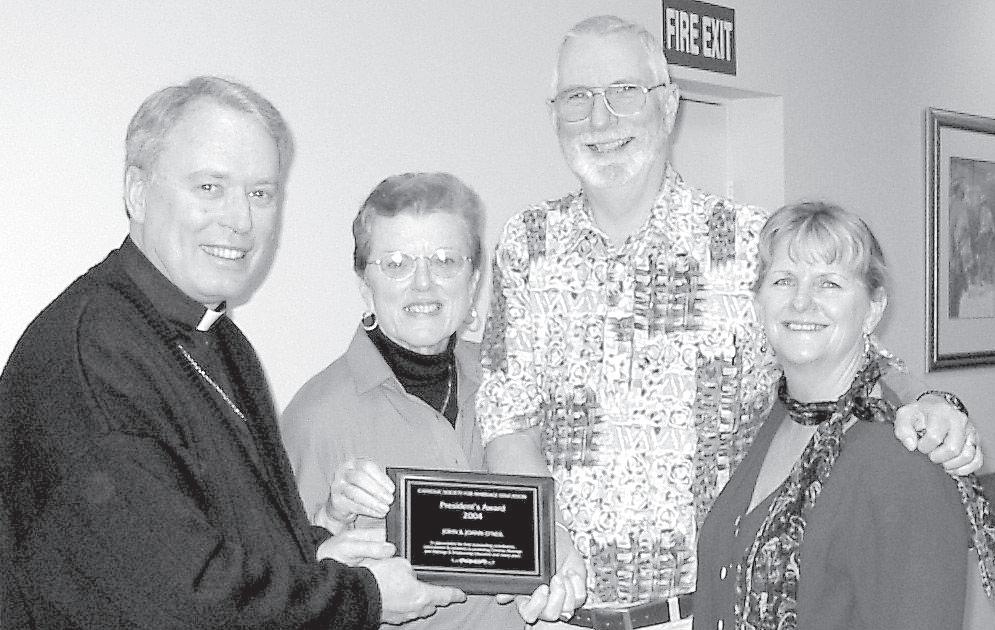
made to
has been in their own community of Mandurah. Living in Mandurah they saw a great need
the
field of marriage and relationship education had ‘come of age’ and, although now semi-retired, we felt the desire to reach out and
share our skills with our wider community.’
Following on from this desire to share knowledge and give support, in 2000 John and JoAnn established the Quality Relationships Alliance (QRA). With the motto ‘co-operation, not competition’, QRA is a group of individuals and organizations that work to help people improve their relationships.
Although the O’Neil’s retired from the position of QRA co-chair this year, their work in creating the alliance and helping it grow has left a strong support network in Mandurah for anyone wanting to give their relationships extra attention and effort.
The plaque presented to John and JoAnn at Thursday’s luncheon was engraved with the words "In appreciation for their outstanding contribution, commitment and initiatives in promoting Christian marriage and relationship education over many years."
After nearly forty years of helping to provide quality support and guidance for couples, the O’Neil’s are deserving recipients of this year’s award.
The Record 6 16 SEPTEMBER 2004
support relationships not only in the church, but in the wider community. In their own words, the O’Neil’s ‘…realised that
marriage education
to
Bishop Don Sproxton presents the President's Award to JoAnn and John O'Neil while secretary to CSME Christina Graves enjoys the moment.
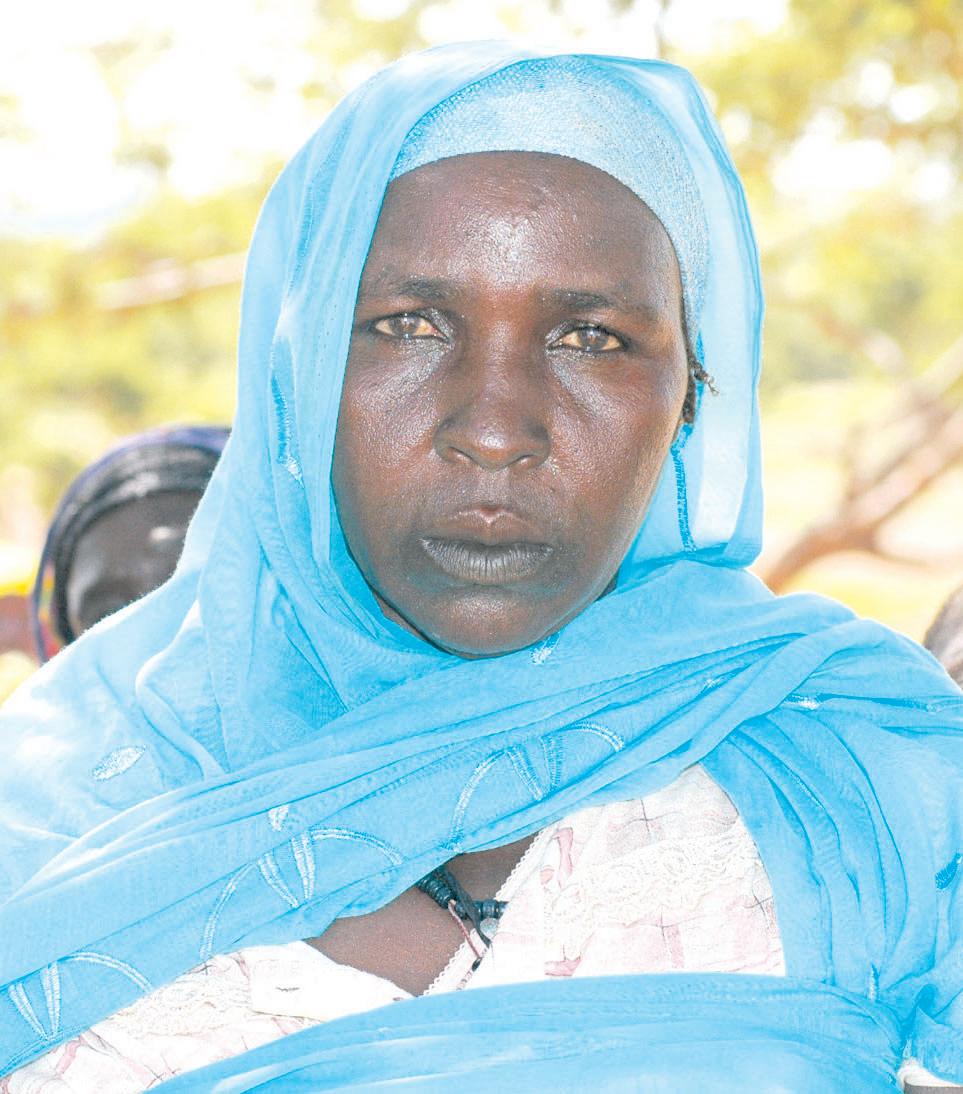
I am a dead person
CNS Assistant International Editor STEPHEN STEELE traveled to Chad in August and September to cover the situation of Sudanese refugees ffleeing the violence in Darfur.
By Stephen Steele
FARCHANA REFUGEE CAMP, Chad (CNS)
- Given that her culture is one where women rarely speak to men who are not relatives, the woman's aggressiveness was startling.
"Look at me," she demanded of a foreign journalist visiting the Farchana refugee camp in northeastern Chad. "I am a dead person."
Her name was Djimie Omar Moussa, and she gave her age as 55. She came to Farchana in January after a Sudanese government
aircraft dropped a bomb on her home in the country's western Darfur region, killing her two daughters and four grandchildren.
The early morning blast threw her from her home; shrapnel wounds were scattered across her body. She walks with a limp, grimacing with most steps. The injuries have left her in a great deal of pain, she said.
"When you live, it is because you have someone on whom you can rely. But because my children are dead, my grandchildren are dead, and I am wounded, this is why I am a dead person," she said.
Foreign journalists find that interviewing Sudanese refugee women is a difficult task that requires a great deal of patience; men usually will answer all questions directed at women. But Moussa sought the journalist and demanded that he listen to her story. She said that several months before the bombing
her husband was killed by the Janjaweed, the Arab militiamen backed by the Sudanese government who have terrorised most of the population of Darfur for the past year. The United Nations estimates 30,000 to 50,000 black Africans have been killed in the campaign of ethnic violence.
"For me, I am dead. The fact that I am alive is only a miracle from God," Moussa said.
Mrs Moussa said she is a trained nurse in Darfur and has offered her services to the medical nongovernmental organizations that work in the camps, but has not received an answer.
"I don't want to stay like this. I want to help; I want to do something. I worked as a nurse for many years. I can help here. They say they don't have enough people to work, so why won't they let me?" she asked.
The Record 16 SEPTEMBER 2004 7
INSIDE: NIGHTS OF TERROR - PAGE 8 ■ AGENCIES GRAPPLE WITH SIZE OF PROBLEM - PAGE 9 ■ ANGEL OF MERCY - PAGE 10
A sea of people, bewildered by violence
“You are either black



Sudanese refugees describe nights of violence, terror in Darfur
By Stephen Steele
It was 4 a.m. one day in early August when Bashir Ismael’s wife left their home for the local market in western Sudan’s Darfur region. It was the last time he saw his wife alive.
Within an hour of her departure, Arab militiamen, known as Janjaweed, attacked his village of Sileya. More than 100 mounted militiamen fired on his village, he said.
“We had no chance to resist. Our people left with nothing; all of our animals were killed,” Ismael said in a late-August interview in the Kounoungo refugee camp in northeastern Chad.
About 240 people from his village and other parts of Darfur arrived on August 26 at the Kounoungo camp, joining about 12,000 other Sudanese. The camp is managed by the Chadian Caritas office, known by its French acronym, Secadev.
The group of men sitting with Ismael under a UN High Commissioner for Refugees tent estimated that at least 42 people from their village were killed in the attack. A fellow villager confirmed for Ismael that his wife was among those dead.
Among the missing are Ismael’s three children, separated in the chaos of the attack. He refused to accept that his children could be among those dead and said he believes another villager took them to safety to another camp, in Darfur or in Chad.
“I do not know where my children are, but I am sure my children are somewhere where will find them,” he said.
Ismael said the attack occurred while most villagers were asleep. The Janjaweed arrived on camels and appeared to be singling out men and young boys, he said. Those that escaped the militia were then attacked by Sudanese soldiers in vehicles.
“First they came on camels and circled the village, then they came in vehicles. Those who ran, cars went after them and shot them down. If you run fast you can save your life,” he said.
Ismael said villagers knew a campaign of ethnic violence against black Africans in Darfur had been occurring for the past year, but they did not flee earlier because their village had never been attacked or threatened.
The early August attack, he said, occurred “without warning.”
“We were attacked because we are black; there is no other reason,” he said.
US. government officials have accused Sudan of genocide in Darfur.
Omar Hussein lifted his traditional Muslim dress to show
Arab. If you are black and in their way, you are finished”.
wounds in both his legs made by a single bullet. Hussein, who now walks with a cane and says he is in great pain, was carried to safety by his neighbors following the attack on Foucha, a village in west Darfur.
He fled to a camp on the Chad-Sudan border, where he developed a high fever as a result of the bullet wounds. Eventually, UN workers brought him to Kounoungo, where he received medical treatment.
Refugees expressed bewilderment at the violence being led by the Arab militiamen.
“We never before had this problem,” said Abdullah Abdulaye, a resident of the Farchana camp, also operated by Secadev.
“For me there is no Janjaweed, there is only the government. They are using the Janjaweed for their own ideas,” he said.
“First they came on camels and circled the village, then they came in vehicles. Those who ran, cars went after them and shot them down. If you run fast you can save your life.”
Asair Mohammed Asair, a resident of Kounoungo, said he was lucky to escape the attack on his village of Ambaro in northern Darfur. Asair, 25, said if he returns to Darfur “They will kill me.”
“There is no need to belong to a political party. You are either black or Arab. If you are black and in their way, you are finished,” he said.
Asair said the attack on his village was well planned. First, government planes dropped bombs, causing villagers to flee their homes. Then militiamen on camelback raided the village, targeting mostly men.
Those that escaped the carnage had Sudanese soldiers waiting for them on the outskirts of the village.
“Several of my neighbors were killed in front of my eyes,” he said.
“When you leave, you grab your children and nothing else. We lost all of our belongings. But in our Muslim tradition, we have to accept our fate,” he said.
Asair said the black Africans in his village had never had problems with their Arab neighbours in the past.
“We grew up among each other; black and Arab children attend the same schools. The Janjaweed are not the people; they work for the government; they are an arm of the government,” he said.
Adam Isaac Djongor, a thin, elderly Sudanese, pulled back his shirt to show the wound from where a bullet grazed his chest. He said the force of the bullet was
so powerful that it knocked him off his feet. When he regained consciousness, a militiaman carrying a club stood over him.
“When he saw I was not dead, he started hitting me in the leg,” he said. The attack left Djongor’s leg slightly deformed. He now walks with a limp.
Many men among the 200,000 Sudanese refugees in Chad show the physical signs of the Sudanese government’s campaign of ethnic cleansing. There are many amputees or those with deformed limbs resulting from bullet wounds and beatings.
But there are also many Sudanese refugees suffering from emotional wounds, showing signs of extreme trauma, explained Jesuit Father Franco Jacuzzi, who has started a program assisting disabled refugees.
“It’s hard to imagine what these people have lived through. They have trauma, depression. But what can we do? There are no therapists in refugee camps,” he said.
Adam Abdallah spoke in a monotone and stared at the ground as he described how his village of Bahr-Saliba was attacked. He said the entire village was burned to the ground and that the Janjaweed looted every home.
“They killed many people,” he said.
The refugees that arrived in Kounoungo were among 7,000 Sudanese to arrive in Chad during August, a sharp increase over the past several months, said Eduardo Cue, spokesman for the UN. High Commissioner for Refugees in eastern Chad.
“This indicates that they’re running out of food, that their animals have died or were stolen,” Cue said. - CNS
Chadian Catholic aid agency manages camps amid trying conditions
By Stephen Steele Catholic News Service
ABECHE, Chad (CNS) -- When Sudanese refugees first began pouring into Chad in 2003, the only people available to help them were workers from the Chadian Catholic aid agency. There was no network of nongovernment organizations available to assist the refugees other than Caritas, known in Chad by its French acronym, Secadev.
“In the beginning, it was very difficult for us to serve them; we had no food, no tents were available, and the refugees were coming from all across the border,” said Anastasie Dewa, spokeswoman for Secadev.
The largest non-government organization operating in Chad, Secadev works primarily on small-scale development projects and was overwhelmed by the scope of the refugee crisis. By September 2004, more than 65,000 black Africans from Sudan had fled west to Chad to escape violence in Sudan’s Darfur region, and the UN High Commissioner for Refugees had launched a $23 million initiative to help those most in need.
“The refugees came with nothing. This is the worst crisis that I’ve seen in Secadev,” said Phillipe Boguel, an 18-year veteran of the organisation and co-ordinator of Secadev’s Abeche office, which oversees the three camps the organisation manages.
Boguel said the early days of the crisis were devastating for the refugees, but also trying for Secadev’s staff.
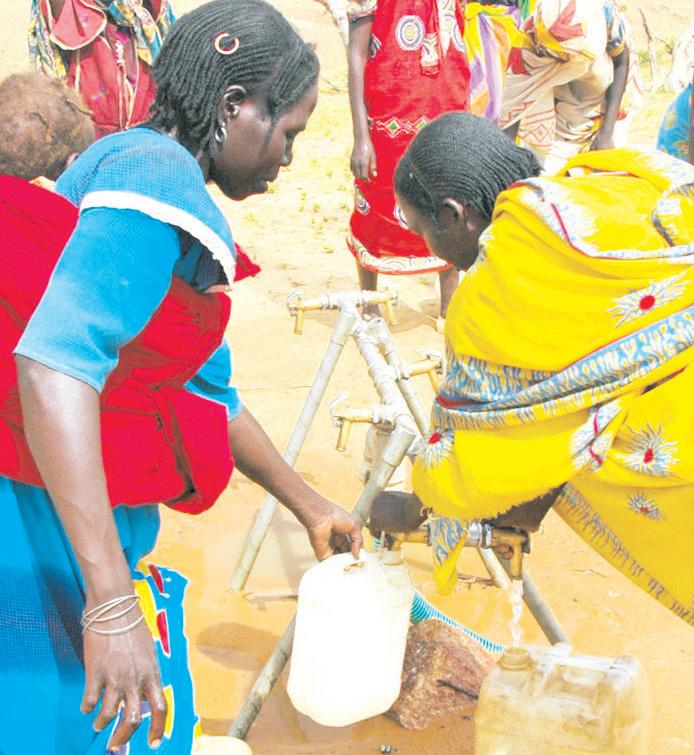


“I spoke with one woman. The Janjaweed killed her husband and child. She witnessed this. When she talks to me, she is crying. It was heartbreaking to hear her story,” he told Catholic News Service.
The Janjaweed are Sudanese government-backed Arab militiamen who have terrorized most of the population of Darfur for the past year.
“Another woman hadn’t eaten in six days. She was there with her daughter. If you saw the girl, you would cry also,” Boguel said.
Secadev is in charge of three camps -- Farchana, Touloum and Kounoungo -- with each camp about 30 miles from the Chad-Sudan border. As managers, Secadev oversees all other non-government organisations assisting the refugees.
Boguel described the camps as a logistical nightmare, with Chad’s harsh landscape providing the aid agency with its biggest obstacle.
Eastern Chad, where the refugee camps are located, is mostly desert with few roads. The roads connecting the camps are dirt paths that wash away during the rainy season. When the rains come, trucks carrying supplies can wait up to several days to reach their destinations, which means distribution of food and other supplies is frequently late, Boguel said.
Boguel also said there were water shortages in several camps, most notably Touloum, where the refugees receive water rations several litres below UN standards.
“There are not enough water stations. The refugees wait at
Aid workers appeared bewildered by Secadev’s absence. Under its contract with the UN. High Commissioner for Refugees, camp managers are required to remain in the camps until the late afternoon.
“How can they leave without telling anyone? This is not the way to operate,” said Belgian Jesuit Father Philippe Marbaix of Jesuit Refugee Service. Father Marbaix is organising schools and training teachers in the three camps Secadev operates.
In another incident, the Secadev co-ordinator refused to send a vehicle out at night to pick up a staffer stranded after his vehicle broke down several hours outside Abeche. The staffer was stranded for more than 24 hours before a vehicle was sent to pick him up.
Alan Isaac of Catholic Relief Services, the US Bishops’ international relief and development agency that is providing technical assistance to Secadev, said Secadev is experiencing “growing pains.”
least two hours to get their water rations,” he said.
"The roads connecting the camps are dirt paths that wash away during the rainy season. When the rains come, trucks carrying supplies can wait up to several days to reach their destinations, which means distribution of food and other supplies is frequently late..”
Boguel expressed concern at UN predictions that up to 100,000 new refugees from Sudan are expected to arrive in Chad before the end of 2004.
“If they come we cannot refuse them, but it will be very difficult to find a place to put them” because the region is running out of water sources, he said.
“The problem of water is very difficult here,” he said.
But Secadev staffers also have struggled with maintaining the international standards of work and completing the reports and hours of paperwork required by the UN High Commissioner for Refugees, which administers the camps in Chad.
During one late-August afternoon, Secadev abandoned the Kounoungo camp before 1 p.m. without alerting other aid agencies working in the camp. Secadev staffers later said they had to leave because they had to complete reports for the United Nations the next day.
Father Marbaix also expressed frustration with the UN system. He said that since June he has sought answers from the UN High Commissioner for Refugees on what textbooks should be purchased for the schools. He said Jesuit Refugee Service had the funds and was prepared to purchase the books.
“No one has told me anything,” he said.
Alfred Dehotibaye, camp manager of Touloum, said his camp had a few cases of malaria and cholera, and he feared the diseases could spread quickly.
Dehotibaye, a Chadian Catholic, said working in the camps was a way for him to express his faith.
“It is very important to me to be a humanitarian worker. I want to be able to help other people,” he said.
Dehotibaye spoke in late August in Abeche, where he was in the midst of a five-day holiday. Up until that time, he had worked every day since February without a day off.
Isaac said Secadev had never worked on a project on the scale of the refugee crisis, but that the agency was learning and improving.
“They have some very exceptional, energetic staff who want to learn and improve. In time, they will be fine,” he said.
His wife and children live in southern Chad, where most of the country’s Christians reside. He has not seen them since he began working in the camps, and a family reunion is still several months away.
“It is very difficult to be without my family, but this is a way of life here,” he said.

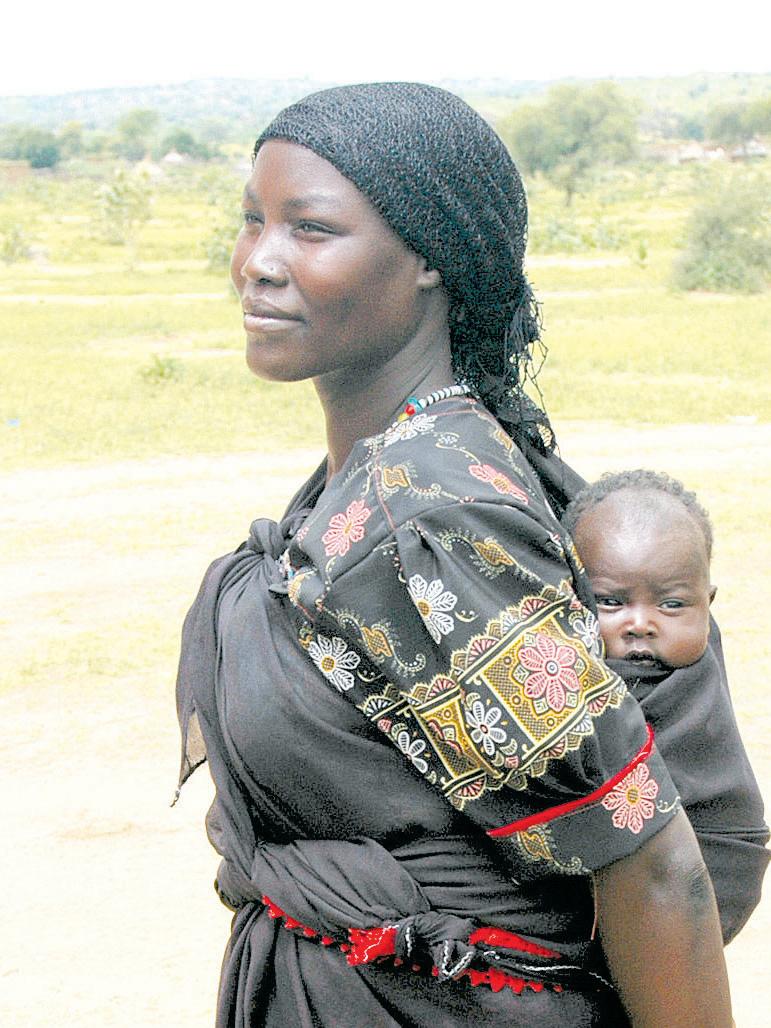


The Record 16 SEPTEMBER 2004 9 The Record 8 16 SEPTEMBER 2004
A
Aug. 28. More than 200,00 Sudanese refugees have fled west into Chad to escape attacks by Arab militias and Sudanese government forces.
Photo: CNS
child looks out from his family’s tent in the Farchana refugee camp in Chad
Catholic Mission Australia currently has four religious missionaries working in Sudan, one Christian Brother, two OLSH Sisters and one Salesian Priest. If you would like to help Catholic Mission continue to send aid to Sudan and achieve their vision of Life for All, please call 1800 257 296 or visit www.catholicmission.org.au to make a donation. Aid to the Church in Need Aid to the Church in Need has an appeal to help the Church in Sudan, particularly the Save the Saveable schools. For more information or to make a donation, contact Aid to the Church in Need, PO Box 6245 Blacktown DC NSW 2148, Phone: 02 9679-1929 or visit www.aidtochurch.org Caritas Is working in tandem with Action by Churches Together. Their appeal can be supported by contacting 1800 024 413 or go to www.caritas.org.au to make on online donation.
Photo: CNS Women retrieve water at the Kounoungo refugee camp in Chad on August 26.
Photo: CNS A Sudanese woman carries her child at the Bredjing refugee camp in Chad
or
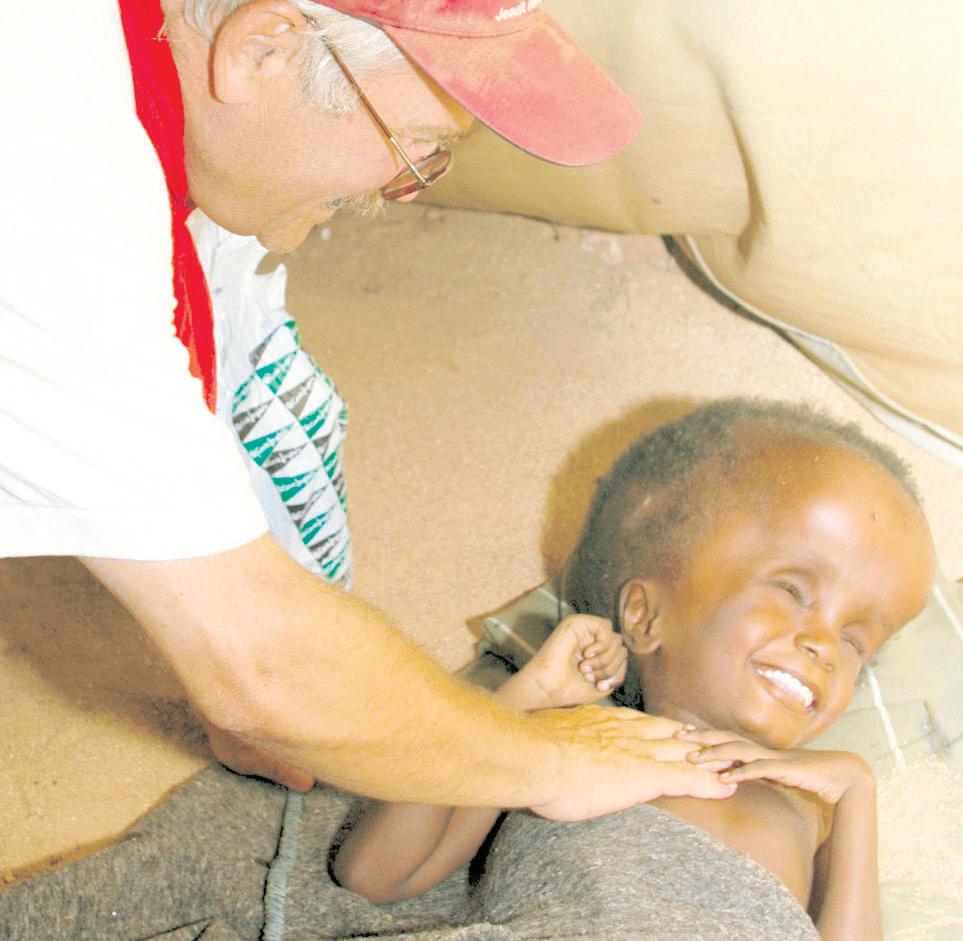
Angel of Mercy gives hope
Italian Jesuit targets disabled Sudanese in Chad refugee camps
By Stephen Steele
KOUNOUNGO REFUGEE
CAMP, Chad (CNS) -- Among the hundreds of thousands of Sudanese refugees in northeastern Chad, an Italian priest has targeted those he considers the most vulnerable: the disabled.
"These people have no voice; they have no rights, so we have to find how to help them," said Jesuit Father Franco Jacuzzi. Aid agencies sought out Father Jacuzzi and two other priests with Jesuit Refugee Service because of their knowledge of teaching.
Since arriving in Chad's refugee camps in June, Father Jacuzzi shifted his focus from schools to disabled refugees. The U.N High Commissioner for Refugees, which administers the camps, keeps no statistics on the disabled.
Father Jacuzzi began taking a census of disabled people in the camps managed by Secadev, the Chadian Caritas office. The
census is an exhausting task in which the priest is practically a one-man team. He relies on Secadev staff to point out areas of the camps where disabled Sudanese reside, but mostly he finds them on his own, by canvassing the miles-long camps on foot.
While visiting one tent in Kounoungo refugee camp, Father Jacuzzi met a young child with hydrocephalus, a rare but treatable condition in which fluid swells the head to several times its normal size. In Kounoungo, the child has no hope of survival.
The young boy smiled broadly and greeted the priest with the traditional greeting among Muslims, "Salaam." He giggled and looked directly into Father Jacuzzi's eyes as the priest caressed the child's face. The priest then gently lifted the child to wipe the dust from his mat. He used a towel to wipe dirt from the child's face.
"This child is not long for this world. But we can help him. We can keep him clean. We can get him a mosquito net. We can visit him and bring him joy. This is our duty," he said. The hard fact
of life for the Sudanese refugees is that only the strong can survive; there is not enough food or medicine to save the weak. But Father Jacuzzi said he believes that the church's presence in the camps can help the weak and sick die with dignity, touched by the kindness and compassion of a stranger.
About 200,000 Sudanese refugees are residing in camps in northeastern Chad, fleeing ethnic violence in western Sudan's Darfur region. Another 1 million black Africans are displaced within Sudan.
Father Jacuzzi has identified 1,000 "vulnerable persons" in Secadev's three camps. The vulnerable include single or widowed women with children.
Most problematic for him is how to care for the mentally ill; there are no therapists or access to drugs for their treatment.
The Darfuris' primitive way of treating the mentally ill is to chain them to a tree. Father Jacuzzi said he has identified about 20 "people in chains" in the three camps.
"I have worked in camps all over the world and I have never
seen this before," he said.
During his visit to Kounoungo, Father Jacuzzi met with two adult brothers whose hands and arms were deformed by polio several years ago. The two can no longer walk and are cared for by their 10-year-old sister.
They arrived in Chad in March. Their father strapped his sons onto two donkeys and walked with them to the Chad border to ensure their safety. He stayed with them until July, then returned to Sudan to check on their livestock and his two other sons, who remained in Darfur. The disabled sons have not heard from their father since.
Father Jacuzzi said the father's struggle to protect his family made him a "heroic figure."
"But this is normal, everyday life for these people," he said.
"When our father was here, he really helped us," said Ibrahim Abdul Karim, one of the brothers.
"Our sister is here, our cousins are here, but they cannot replace our father. If he would return, it would be a great joy for us," he said.
Father Jacuzzi said it was
essential for the disabled Sudanese to have an advocate working on their behalf.
"Otherwise it would be too easy for them to miss their food distribution," he said. "They are used to having nothing, so they will not ask. We have to push to help them."
The priest expressed frustration by the slow pace of work. Since June, a funding agency has promised a vehicle, which by late August had not arrived. Instead, Father Jacuzzi and other Jesuits have to hope Secadev has room for them in its vehicles, or they must hitch a ride with visitors to reach the camps.
"It is so difficult to work here," Father Jacuzzi said.
"In the United States, in eight hours you can travel coast to coast and still work for a few hours," he said. "Here you are lucky if you can go 200 kilometres (125 miles). And by then your body is so beaten and broken all you can do is sleep. In the camps, it is so hot that if you don't drink water every 20 minutes, you feel sick."
The Record 10 16 SEPTEMBER 2004
Gender Letters
Does JPII really understand women?
MARY SHIVANANDAN
offers a woman's view of the Vatican's new document on collaboration between the sexes
The “Letter to the Bishops of the Catholic Church on the Collaboration of Men and Women in the Catholic Church and in the World” opens by saying that “the Church is called today to address certain currents of thought which are often at variance with the authentic advancement of women.”
Fundamentally, these currents of thought are linked to the rise of radical feminism. Since women are vulnerable in bearing and rearing children, feminists see this as an almost inescapable invitation to oppression by men.
To overcome this exposure to “domination,” women must at all costs be in control of their bodies in order to be on a level playing field with men in the family and all areas of society. Such an attitude is hostile to both men and women.
Since it is not possible to do away with sexual difference altogether, these feminists want to separate the physical, biological differences of “sex” from gender. Gender then becomes a purely cultural construct.
In this view - I am citing here French pioneer feminist Simone de Beauvoir - femininity per se no longer exists as a fixed entity with determined characteristics. There is no such thing as the “eternal feminine.”
Other feminists have gone even farther in rejecting sexual difference. They charge that even claiming the right to be different is to claim the right to be oppressed. Women don’t want to “be” men but to destroy the very idea of both man and woman. Above all, they seek individual autonomy and control of their lives.
As the document points out, this desire to be autonomous and to determine one’s own sexual identity has profound effects on the family and society.
In the 1970s, I attended the annual conference of a national secular family organization. The definition of the family was already undergoing revision
MARY SHIVANANDAN is a Professor of Theology at the John Paul II Institute for Studies on Marriage and Family at Catholic University of America and author of Crossing the Threshold of Love: A New Vision of Marriage in the Light of John Paul II’s Anthropology (CUA Press).
into several types on an equal footing: the traditional nuclear family of father, mother and children; the single-parent family; the blended family; and the family with both “parents” of the same sex.
In the late 1980s, the push began to get literature into family-life courses in public schools to validate the homosexual and even bisexual lifestyle.
I recall the frustration of the four of us who were Catholic representatives on a committee to choose the educational materials for family-life courses.
In our efforts to uphold the traditional definition of marriage as the exclusive and permanent union of a man and a woman and the proper context for the generation and upbringing of children, we were outvoted almost every time.
in their communion constitute the full image of the Trinity.
As John Paul II said in his audience on November 14, 1979: “Man becomes the image of God not so much in the moment of solitude as in the moment of communion. This is essential for “active collaboration” in the family, in the workplace and in society.
If these false ideas have arisen in the area of women’s sexuality, then the solution must lie there also. Pope Paul VI’s encyclical “Humanae Vitae” - truly a sign of contradiction - is the cornerstone of a new feminism.
If the body expresses the person, then the way it is designed to express the love between the man and the woman must surely have something to say to us about collaboration in other areas of life. “Humanae Vitae” is not simply about the evils of contraception. It presents a blueprint for true marital happiness and relations between men and women.
to Families,” John Paul II calls the passage a “compendium or summa in some sense, of the teaching about God and man that was brought to fulfilment in Christ.”
In working together for the good of the family and society, both the man and the woman will succeed if in doing so they fulfil themselves in the action.
The document has spelled out ways in which women, both married and single, can fulfil themselves by participating in the work of society.
The woman’s maternal role, linked to her orientation to relationship, needs to be honoured so that she can choose to stay home to care for her children.
The woman’s presence in the home provides an atmosphere that nurtures culture and that in itself is a major contribution to society.
“Man becomes the image of God not so much in the moment of solitude as in the moment
of communion. This is essential for “active collaboration” in the family, in the workplace and in society.
Over time these ideas - so pervasive in Western secular culture - have penetrated even Catholic institutions. As the document points out, there has been a concerted effort by feminist Scripture scholars to reinterpret Scripture to accommodate this so-called liberation of women.
For example, Phyllis Bird and Phyllis Trible, in reinterpreting the Genesis creation accounts, link the blessing of fertility purely with our animal nature and the human role of dominion with our humanity. The result is a greatly impoverished understanding of the nature of man and woman and their communion.
The new document defines the Church’s response as “active collaboration.” It gives a beautiful summary of John Paul II’s theology of the body. Without understanding this foundation there can be no true liberation of either man or woman.
In John Paul II’s understanding of Genesis, woman is in no way less subject than the man. Each of them is a fully self-conscious self-determining person made in the image of God.
Furthermore, neither alone can fully image God. Both together
Since the 1970s, I have been involved in the natural family planning movement and have been fortunate to know couples who put the Church’s teaching into practice. I have also had an opportunity to participate in research on just why it helps marriages and brings a new appreciation of both masculine and feminine values.
For the woman it is deeply satisfying to be accepted by her husband as she is. The sacrifice he makes of his sexual desires to cherish their joint fertility greatly increases her love for him. The very process of jointly monitoring their fertility increases intimate communication. One of the highlights of their marriage is consciously conceiving a child together and sharing in its nurture. The struggle with abstinence brings the reward of self-mastery for self-gift, as John Paul II would say. When they trust in the way God has made them as man and woman, they learn to trust God more and surrender to his will in every area of their lives.
It seems to me that here is a model for “active collaboration” in the workplace and society as well as the family. If man and woman are by nature oriented to each other, then feminine values in society can only flourish in a society that truly honours masculine values.
Without the right kind of masculine leadership - sometimes called servant leadership - feminine values cannot flourish.
Christ, of course, is the model for servant leadership. The recent document gives a hint of this in talking about Christ’s power as “neither one of domination nor of power as understood by the world.”
Ephesians 5:21-33 is a key text for discovering the role of the bridegroom/husband. In “Letter
As a place where work is performed freely out of love, the home provides a counterfoil to our commercial culture in which everything has a price tag. The home is a place, too, where the uniqueness of each person is valued and spiritual values are fostered as it is a “domestic church.”
Alternately, the document exhorts that “an appropriate work-schedule” needs to be made available so that the woman who wishes or needs to contribute specific talents to society can do so without undue stress to herself and the family.
There have been great advances in providing flexible work schedules. The development of the Internet and telecommunications enable more and more women, as well as men, to work from home and make their own hours.
Changing careers has become more usual, and opportunities to return to school have increased. The workplace itself benefits from women’s attention to the personal and concrete. They can moderate overemphasis on the “bottom line” in business and bring concern for each person to all professions. In looking at how the Church benefit from feminine value the document particularly mentions Mary’s faith and obedience to God as the model for all believers. Her “fiat mihi” is far from passive.
In the encyclical “Redemptoris Mater” John Paul II says Mary’s response to the angel Gabriel shows her to be an “authentic subject” - her own person. She has a stupendous decision to make and she makes it freely. Her courage is completely dependent on her trust in God. Men can well learn this courageous and humble trust from women.

The Record 16 SEPTEMBER 2004 11
- ZENIT

My
faith is in prayer
Pope John Paul II said that as his physical strength decreases his conviction that prayer can bring peace increases.
"Three years have passed [since Spetember 11] and, unfortunately, from that day terrorism seems to have increased its threats of destruction," said the Pope in a message read by Cardinal Walter Kasper, president of the Pontifical Council for Promoting Christian Unity on September 7 at an interreligious meeting for peace.
The Pope said there is no doubt that the threat of terrorism must be met with "firmness and decisiveness in combating the death-makers," yet nations also must work to uproot anything that favours the growth of terrorism, particularly "poverty, desperation and hollowness of hearts."
Even with terrorist activity increasing around the globe, the pope said, "we must not let ourselves be overcome by fear, which leads us to close in on ourselves and which reinforces the selfishness of individuals and groups."
Fear, he said, must give way to "the courage to globalise solidarity and peace," particularly in Africa and in Iraq.
The Pope told the Milan meeting, sponsored by the Rome-based Community of Sant'Egidio, that he is as convinced as ever that religious leaders and believers can make huge contributions to stopping war and promoting reconciliation among peoples.
"I was convinced of it in October 1986 in Assisi (Italy) when I asked members of all religions to gather alongside each other to pray to God for peace," he said. "I am even more convinced today. While the strength of my body declines, I feel even more strongly the strength of prayer.
"At the centre of my worries, I have the beloved Iraqi people upon whom, everyday, I invoke from God that peace that men do not know how to give," he said. Pope John Paul said that as anyone from a wartorn country knows "violence always generates violence. War throws open the doors to the abyss of evil."
In war the unthinkable becomes possible and rights are trampled, he said.
"For this reason, war always is to be considered a defeat: a defeat of reason and of humanity," he said.

International News
Catholic news from around the world
Priest who ministered at school massacre warns of mounting tensions
By Jonathan Luxmoore
APolish priest who ministered to survivors of the school massacre in southern Russia has warned of mounting tensions and urged religious leaders to calm demands for revenge.
"Having been a priest for 22 years, I should perhaps have been better prepared, but having watched car after car bringing little children's bodies for burial, I'm deeply shocked," said Father Janusz Blaut, pastor of the Catholic parish in Vladykavkaz, capital of the North Ossetia province.
"The Church's task will be to calm emotions and discourage people from answering evil with evil. But it won't be easy to convince a father who's lost his wife and four children - not by some natural catastrophe, but through a human act of terror," he said.
The priest spoke by telephone on September 7 after attending a third day of funerals at nearby Beslan, where more than 320 children and adults died on September 3, during the end of a school hostage situation caused by suspected guerrillas sympathetic to the breakaway republic of Chechnya.
Father Blaut said tensions were running high, with locals blaming the government of President Vladimir Putin as well as Chechen separatist leaders.
"In their pain and anger, people have turned on both sides, accusing the authorities of corruption and asking how this event could possibly have happened," said Father Blaut, a priest from Poland's Katowice Archdiocese who has worked in Russia's Caucasus region for a decade.
"They say the government lied about how many hostages were involved. The lack of truthful information is the worst thing for them," he said.
More than 1,200 people were taken hostage in the school; in addition to the dead, more than 700 were wounded.
Speaking on September 8,
Revenge’s temptation
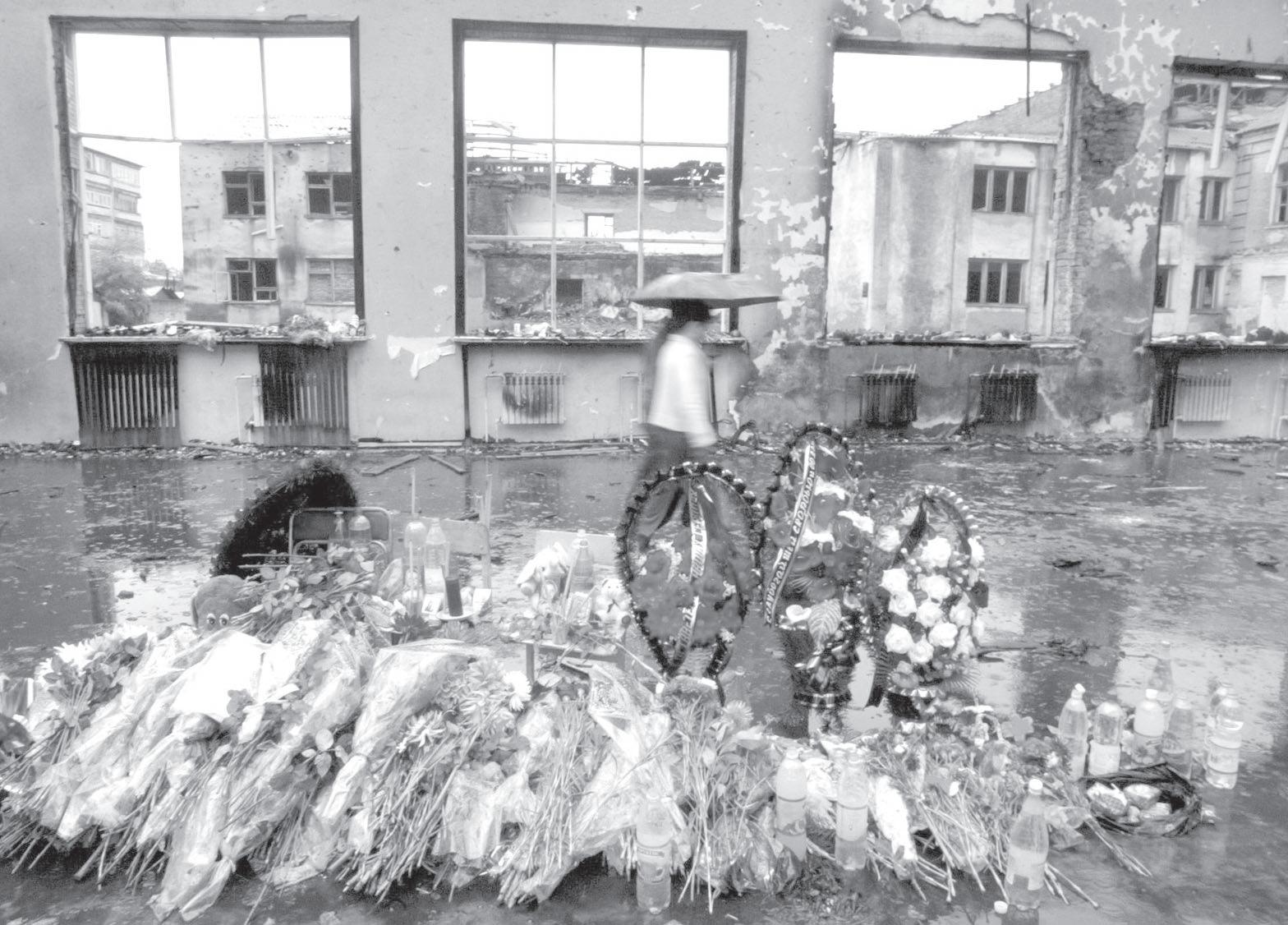
Putin offered a US $10 million reward for information leading to the "neutralisation" of former Chechen President Aslan Maskhadov and rebel leader Shamil Basayev and warned of pre-emptive strikes against terrorist targets worldwide.
He added that he had prayed with bereaved family members in the school's devastated gym, which was strewn with discarded shoes and clothes, as well as with flowers, candles, sweets and toys left by mourners.
"It's a truly shocking sight of bloodstains and bullet holes, one of total silence interrupted only by the sound of crying," the priest said.
"I introduced myself as a Catholic priest and did what I could to keep their spirits up, telling them life would continue even after such a tragedy. But the TV images can't convey the desolation of this place,"
he said. The Catholic parish of Vladykavkaz includes only a single family in Beslan whose children attend a different school. Father Blaut said the Catholic aid agency Caritas had sent medicine and syringes to local hospitals in cooperation with the Red Cross and was ready to respond to other specific needs.
He said Beslan's 30,000 inhabitants were mostly "very poor," surviving on home produce, and were desperately short of food, clothing and counselors.
"This tragedy has touched everyone, creating an atmosphere of solidarity, but in two to three months they'll be left alone with their problems," the Polish priest said.
"The need for psychological support extends not just to those who were in the school, but also to parents, friends and neighbors who were forced to watch helplessly from out-
side," he said. The priest said the "greatest fear" among local people was that the funerals of victims could be followed by a wider conflict similar to the 1992 war between North Ossetia and the neighboring republic of Ingushetia.
He added that local Christians and Muslims had been united in attempts to ensure local reactions did not "pour oil on a fire that can't be put out."
"People remember what war leads to, but those who've suffered such bereavement may well be prepared to do anything in revenge," the priest said.
"At the moment, we're all together - Catholics, Orthodox and Muslims," he said. "But people will relive this terrible event as life goes back to its normal pattern. Children are sacred, and when someone raises his hand against them, the resulting spiral of death will be hard to stop."
Director honoured for posing the big questions
Vatican presents Wim Wenders with spiritual cinematic award
A top Vatican official presented German director Wim Wenders with a spiritual filmmaking award during the annual Venice Film Festival.
US Archbishop John Foley, head of the Pontifical Council for Social Communications, praised "the director's courage in asking the
 Wim Wenders
Wim Wenders
essential questions about man's existence," as he presented Wenders with the annual Bresson Prize Sept. 8. Wenders' films "offer a starting point for
constructive reflection" and "show that cinema is an appropriate instrument for spreading values and culture," the archbishop said in his speech.
The 59-year-old cinematographer is best known for the films "Paris, Texas" in 1984, "Wings of Desire" in 1987, and the "Buena Vista Social Club" in 1998.
Wenders was attending the northern Italian film festival to present his recent film, "Land of Plenty," which deals, Wenders said, with
"poverty, paranoia and patriotism" in present-day America.
Archbishop Foley told Vatican Radio Sept. 8 it was "important the church take part in a showcase like the one in Venice."
"It is even more important to recognize the role film directors play in cinema, since they can touch people's hearts," he added.
In his speech, the archbishop said Wenders' work helps "people reflect upon the needed task all
people are called upon to spread -- the universal values which humanity still requires" for its progress.
The Bresson Prize, named after French director Robert Bresson, was established in 2000 to recognize artists who "give significant witness" in the spiritual meaning of life.
The award is organized by the Italian Magazine of Cinematography and the pontifical councils for Culture and Social Communications.
The Record 12 16 SEPTEMBER 2004
-
CNS
Local residents walk past flowers on Sept. 6 and view the gym where heavily armed rebels held hostage hundreds of school children and adults in the town of Beslan in the Russian province of North Ossetia. At least 335 people were killed in the siege that ended Sept. 3 in a firefight between the hostage-takers and police. The pope called the school takeover a “vile and heartless act.”
Photo: CNS

Charismatic show lights up
Catholic charismatics in Australia are small in number. But in California a Catholic charismatic renewal convention draws
12,000
By Paula Doyle
Growing in intergenerational appeal, the 33rd annual Southern California Renewal Communities' Catholic Renewal Convention drew more than 2,000 young people.
Approximately 12,000 participants - including children, teens, young adults, families, singles and seniors - attended the September 3-5 event.
Opening the assembly was Dominic Berardino, president of the Southern California Renewal Communities, which serves the Catholic charismatic renewal in the Los Angeles Archdiocese. He commented on what he said is the underreported "spiritual vitality" of the Church. His remarks - and prayers for victims of the school hostage situation in Beslan, Russia - were followed by a rousing talk from Alex Jones, a former Pentecostal minister who is now a Catholic and works for the Detroit archdiocesan evangelization office.
"We are living in one of the greatest periods of Church history," said Jones. "In spite of the (clergy sexual abuse) crisis going on in the Church, this is an
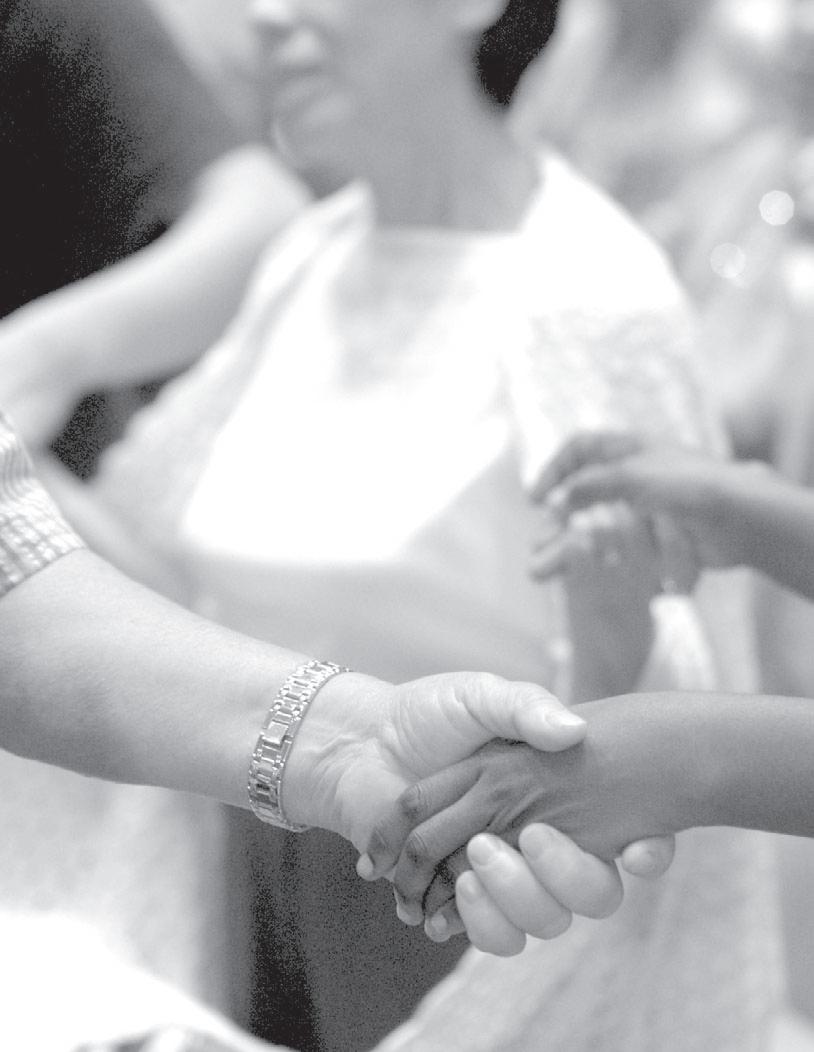
exciting time to be a part of the Church.
"This is not a time to be critical... it's time now to rejoice in
the Lord and to be filled with the Holy Spirit and to do the work of ministry. All we need is to fan into flame the gifts that God has
It’s back to basics for JPII
Pope begins renewed focus on Eucharist
By John Thavis
A fter an intense quarter-century of teaching, writing and traveling, Pope John Paul II is going back to the basics with a renewed focus on the Eucharist. He has convened a special eucharistic year that begins in October. Last year he wrote an encyclical extolling the Eucharist as the source and culmination of the Church's life. He has convened a Synod of Bishops on the same topic for the fall of 2005.
And more frequently he speaks of the importance of the Eucharist in the life of each Catholic.
The Eucharist has a "transforming power" that provides the courage to live the faith and to spread the Gospel, the Pope said in June before leading a eucharistic procession through downtown Rome.
"There's a very close connection between the Eucharist and announcing Christ," he said.
Cardinal Jozef Tomko, who heads the Vatican's committee for international eucharistic congresses, said the Pope is convinced that unless Catholics have a firm understanding of
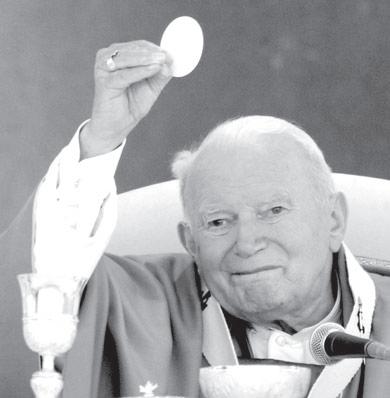
the Eucharist the Church's many missionary and social activities lose meaning.
"More and more, the Holy Father is turning back to the central mysteries of the faith," Cardinal Tomko said in an interview on September 8.
"He is focusing now on the Eucharist as the special presence of Jesus Christ among us. But this is a mystery - the idea that Christ has given his own body for us to eat. It is a very hard language for people to accept," he said.
Cardinal Tomko will be the Pope's personal representative at the International Eucharistic Congress in Guadalajara, Mexico, from October 10-17, when the eucharistic year is inaugurated. In the United States, most discussion of the Eucharist this year has revolved around the contro-
given to us."
Workshop presenter Robert Canton, who spoke at one of the six workshops offered in the first session immediately following the assembly, also urged convention participants to boldly witness the faith.
Canton, a lay evangelist who has an international healing ministry, declared to a rapt audience: "We are called to give glory to the Lord and to be a witness of God's power."
To access the power of healing and miracles, said Canton, Christians must draw close to Jesus.
"If you want to do his works, cling closely to him," he said. "We should be hearers and doers of his word," said Canton. He urged participants to step out in faith and use the name of Jesus when praying for healing.
Speaking on the convention's theme of "My grace is all you need," Sister Linda Koontz declared: "Grace is what is unique about Christianity."
According to Sister Koontz, a member of the Holy Names of Jesus and Mary congregation, Christianity is the only religion that dares to make God's love unconditional.
She said Christians living in today's competitive, looking-outfor-No.-1 world "need an extreme makeover" in their minds.
"God wants to bless you so you can be a blessing to others," she said. "Don't magnify your prob-
lems any longer - magnify the Lord... start saying 'I am favoured by God.' Trust in him. He gives grace to the humble." Father Lou Cerulli, presider at the September 3 evening Mass, called grace "God's free gift of himself to us," making it possible for Christians to share in divine nature.
"Continue to give your heart to the Lord. Don't let anyone or anything rob you of grace," urged Father Cerulli, a Canadian priest who leads retreats and healing services in the United States and Canada.
Manuel Soliz, 74, who with his wife and son came to attend the convention, called the event "a wonderful, uplifting experience."
His wife, Connie, 67, said the workshops provided the "kind of message we continually need to hear to build up our own faith."
Joyce Meersman, 64, a prayer group leader at Holy Spirit Church in Fountain Valley, called the convention a blessing that she looks forward to every year. "I learn so much," Meersman told The Tidings, newspaper of the Los Angeles Archdiocese.
Fellow prayer group member Tami Belies, 32, a first-time attendee, described the convention as "a real call to people to come back to God."
Allen Shepherd, 18, who attended the teen workshops and liturgies, said the event "rocked." "You could feel the Holy Spirit in the room," declared Shepherd. - CNS
versy over Catholic politicians who disagree with church teaching on abortion. Some bishops have said they would refuse to give Communion to such politicians.
Despite the risk of politicising the Eucharist, many observers in Rome and at the Vatican are not unhappy the Communion issue has been raised.
"The whole question of being in a proper disposition to receive the Eucharist is something that's been practically untouched for decades in many parts of the world," said Father Thomas Williams, a member of the Legionaries of Christ who teaches at Rome's Regina Apostolorum University.
"In the aftermath of the political debate, I think the coming year will be an opportunity for instruction on what this means," he said.
Father Williams predicted the 2004-2005 year of the Eucharist would have a ripple effect throughout the Church. He said it's very much in keeping with the pastoral style of this pope, who has dedicated years to Mary, the rosary and the family, among other things. "He just keeps throwing out the net, and every time these things affect a lot of people positively," he said.
Police fiddle with motive for murder of priest
An Indian bishop led a demonstration of thousands of Catholics to protest the police investigation into the murder of a Catholic priest.
Syro-Malabar Bishop James Pazhayattil of Irinjalakuda led the September 9 march in which protesters accused police of trying to protect those responsible for murdering Father Job Chittilapilly, reported UCA News, an Asian church news agency based in Thailand.
"We want the government to order a probe," the bishop said.
On September 7, police arrested Panthalkoottam Raghukumar, a 25-year-old Hindu. They told media that the youth confessed to murdering Father Chittilapilly to protest the priest's "anti-Hindu activities" - charitable activities for Hindu families.
The next day, however, police investigators retracted their account of Raghukumar's motive. They claimed Raghukumar, a drug addict, stabbed the priest when he was high on drugs.
Church officials refuse to accept the revised explanation.
"We believe there is a com-
munal conspiracy" in the events, said Bishop Pazhayattil. Raghukumar allegedly belongs to the pro-Hindu Indian People's Party, India's main opposition party, but local party leaders denied he was a member or worked for them.
Father Chittilapilly, 71, was found dead on August 28 on a porch at Mother of Grace Parish, 38 kilometres north of Cochin. His body bore four stab wounds. An autopsy later confirmed the stab wounds caused the death.
Father Chittilapilly often visited the homes of poor people, regardless of their religion, to pray for them. He helped raise money for hospital and education expenses for the poor, mostly Hindu families. At times he took suffering Hindus to a nearby Catholic charismatic centre for prayers.
Some Hindu leaders allegedly had warned him against his involvement with the Hindu families, but an Indian People's Party leader, Ravikumar Uppath, said, "The murder of such a noble Catholic priest was a shameful act, and we condemn it." - CNS
The Record 16 SEPTEMBER 2004 13
around the world International News
Catholic news from
Participants in a Catholic Charismatic Conference join hands in prayer. The charismatic renewal is a contemporary spiritual movement that emphasises the presence of the Spirit in the Church. Charismatic groups are characterised by openness to spontaneity and emotional expressiveness in worship and community prayer.
Photo: CNS
eye Catcher
BUILDING TRADES
BRICK re-pointing. Phone Nigel 9242 2952
ELECTRICIAN, Power/ light points from $50 each. Rewiring our speciality. 0418 941 286, 9279 5008.
PERROTT PAINTING Pty
Ltd for all your residential, commercial painting requirements. Phone Tom Perrott 9444 1200.
PICASSO Painting. Top service. Phone 9345 0557, fax 9345 0505.
CATHOLICS CORNER
RETAILER of Catholic products specialising in gifts, cards and apparel for baptism, communion and confirmation. Ph: 9456
1777. Shop 12A, 64-66 Bannister Road, Canning Vale. Open Mon-Sat
FURNITURE REMOVAL
Due to the large number of contributions to the Panorama section it is important to get your items in as soon as possible.
Email: administration@ therecord.com.au
or phone:
KYLIE 9227 7080.
Please note: deadline for panorama Tuesday 12 noon. The Record reserves the right to edit panorama items for space purposes.
DUNSBOROUGH - New 4 x 2, great location, sleeps 9. Ph: 0407 409 787.
RELIGIOUS PRODUCTS
THE HUMBLE MESSENGER 9225
7199. Shop 16/80 Barrack St (inside Bon Marche arcade), Perth.
ROSARY BEADS
CUSTOM crafted crystal rosary beads and chaplets all occasions Ph: Joanne 0414 624 580
HUGE room in spacious modern Yokine villa for quiet, strictly conservative/ traditional minded (working) catholic lady. BIR, s/ens, close amens, safe, private, and secure. $75 pw plus phone. PH 9440 5952
THANK YOU
THANK YOU to the Virgin Mary. For my request granted. This prayer is never known to fail. Oh most beautiful flower of Mount Carmel, fruitful vine, splendor of Heaven, Blessed Mother of the Son of God, Immaculate Virgin, assist me in this my necessity. Oh Star of the Sea, help me and show me herein you are my mother.
Oh Holy Mary Mother of God, Queen of heaven and earth I humbly beseech you from the bottom of my heart to succour me in my necessity. There are none that can withstand your power. Oh show me here you are my mother.
Oh Mary conceived without sin pray for us who have recourse to you. (x3) Holy Mary, I place this cause in your hands (x3) Thank you for your mercy towards me and mine Amen.
Dinner with Archbishop Barry J Hickey
28 September 2004 6.30pm
The White House (Isaia House of Prayer) 18 Teague St Victoria Park
Single, Catholic men, 19 years old and older who are seriously considering the priesthood are invited to join the Archbishop for dinner and discussion
Please make a Reservation Fr Armando Tel/Fax: (02) 9470 9113 Email:frarmando@perthcatholic.org.au
panorama a roundup of events in the archdiocese
SundaySeptember 19
Eternal Word Television Network 1 - 2 pm on Access 31. The Power of the Cross / Fr John Corapi. A special program is planned the following week, featuring the actress who takes the part of St Therese in the forthcoming film: Lindsay Younce discusses her conversion with Marcus Grodi in the Journey Home series. Let others know about the Sunday program, and about availability of videos on loan from free lending libraries. We are greatly in need of donations to enable the program to continue, and for volunteer helpers. The Rosary Christian Tutorial Association, PO Box 1270, Booragoon 6954; email: leigh@geegle.com Phone 9330 1170.
Sunday September 19
GATE OF HEAVEN
Please join us this Sunday at 7:30pm on 107.9 FM, Radio Fremantle, for more Global Catholic Radio. This week we will feature: (1) Hail Holy Queen: Rediscovering Mary; The Real Ark with Dr Scott Hahn & Mike Aquilina. (2) GK Chesterton: What’s Wrong with the World with Dale Alquist. (3) Defending Life: Strategic Overview (B) with Fr Frank Pavone. Donations toward the program may be sent to Gate of Heaven, PO Box 845, Claremont, WA 6910. Programs subject to change without notice.
September 20-24
NEW AND DIVINE HOLINESS
RETREAT
At Casa di Luisa Piccarreta, Spearwood. Come and hear about Luisa Piccarreta, her special mission and the relevance of this mission for you and the church in our times. Dr John Brown is presenting a series of talks 9am – 3pm and 7.30pm – 9.30pm daily. Mass is celebrated each day. Archbishop Hickey will spend half a day with us during this retreat & celebrate Mass. Enq: Michelle Grabsch or Jenny Troy 9494 2604.
Thursday September 23
FEAST OF ST PADRE PIO OF PIETRELCINA
Honour the great saint of our times. Padre Pio, who suffered for 50 years the five wounds of the crucifixion as a true victim with Christ! Invoke God’s blessings on Perth environs! Pray for our families, our nation and peace in the world. Come and join in the celebration at 4pm Holy Hour, 5pm Procession and Holy Mass; bringing a plate is greatly appreciated. All Saints Chapel, 77 St Georges Terrace, Allendale Square Perth.
Friday September 24
BUSINESS PERSONS MASS
Will be celebrated at All Saints Chapel, Allendale Square, Perth at 7am followed by a Breakfast Meeting at the WA Club, 101 St Georges Tce Perth. The Guest Speaker will be Professor Peter Dallimore of Notre Dame University. Enq: 9384 0809.
Sunday September 26
ST NORBERT COLLEGE FAIR
St Norbert College 135 Treasure Rd, Queens Park 10am – 4pm. Come and join the fun. Free entertainment. Enq: Joanita 9277 1731.
SundaySeptember 26
BULLSBROOK SHRINE
PILGRIMAGE
The next monthly pilgrimage in honour of the Virgin of the
Revelation, will be held at the Shrine of Virgin of the Revelation, 36 Chittering Rd, Bullsbrook at 2pm. The pilgrimage includes the Rosary, the Pilgrimage Mass at 2.30pm, procession to the Shrine, Benediction of the Blessed Sacrament and the blessing of the sick. All are most welcome. Reconciliation is from 1.30pm prior to the Pilgrimage Mass celebrated at the Shrine every Sunday at 2.30pm. Bus transport for the Pilgrimage departs Barrack St at 12.30 for Bullsbrook via Highgate, Guildford and Midland. For bookings: tel 0409 296 810 or 9277 5378 Enq: SACRI on 9447 3292.
Tuesday September 28
SPIRITUALITY IN THE PUB
Will be held at the Elephant and the Wheelbarrow, Lake St Northbridge at 7.30pm. Jenny McNae, actress and Greg Mitchell, educator will discuss the inspirational nature of humour, continuing our theme: Embracing Hope. Come and join us for a meal from 6.30pm. All welcome. Enq: Andrew 0422305742.
Friday October 1
PRO-LIFE PROCESSION
The First Friday Mass, procession and rosary vigil will commence at 9.30am with Mass celebrated at St Brigid’s Church, Midland. The Franciscan Friars of the Immaculate will lead us. All are invited to witness for the sanctity of life and pray for the conversion of hearts. Enq: Helen 9402 0349.
Friday October 1
COURAGE PRAYER MEETING
5.30pm, 1st Friday of the Month: Support/fellowship for people with same-sex attraction. Goody Hall 39 Jugan St, Glendalough Ph: 9242 4066 (8am-4pm) www.geocities. com/brisbanecourage/ <http://www. geocities.com/brisbanecourage/>
October 1-3
WEEKEND RETREAT FOR NURSES
The Catholic Association for Nurses invites you to a weekend of prayer, relaxation and reflection at the New Norcia Guest House. RSVP by 24/09/04 on 9242 4066.
October 1-3
INNALOO ANTIOCH YOUTH WEEKEND
Run by and for young people aged 15-23 years, it is a chance to grow spiritually through prayer, music, talks and activities, but also a great place to meet new people in a fun, friendly and enthusiastic atmosphere. Enq: George on 0422 041 374, or at gstevens_ 99@hotmail.com.
October 1-3
GOD’S FARM RETREATS
Fr Paul Glynn s.m., is taking Brother Andrew’s 4th Anniversary Retreat at God’s Farm 40k’s south of Busselton. A chance to lose the world and find God in the stillness and amazing beauty of Spring. Fr Paul’s last retreat here October 15-17. Enq: Betty Peaker, PO Box 24 Cowaramup 6284. Tel/Fax: 9755 6212.
October 1-3
ANCHOR WEEKEND
The Disciples Youth Mission Team invite you to this fun, dynamic weekend for high school students. Packed with games, music, prayer, Mass, Reconciliation and food! Jarrahdale Scout Camp, cost is minimal, and covers all food, accommodation and transport
for the weekend. Contact Dave Haydon – 9204 2142 for details and transport, bring your friends.
Saturday October 2 WITNESS FOR LIFE PROCESSION
The next First Saturday Mass, procession and rosary vigil will commence with Mass at 8.30am at St Anne’s Church, Hehir St Belmont. We proceed prayerfully to the Rivervale Abortion Centre and conclude with rosary. Led by Fr Paul Carey ssc. Please join us to pray peacefully for the conversion of hearts. Enq: Helen 9402 0349.
Saturday October 2 CANDLE LIT PEACE MASS AND SUPPER
Reflect, Pray, Remember, Sing, Renew. The UWA Catholic Society invites you to join them at 6pm in the Quinlan Room, St Thomas More College. Bring a candle to burn and be blessed for your prayer intentions. Drinks provided. Please bring a plate. To RSVP or for more info: ucs-spiritual@guild.uwa.edu. au or www.ucs.org.au
Oct 1, 2, & 3 CHRIST OUR BEAUTIFUL SAVIOUR
Mini Retreat led by Father Anthony Van Dyke OP. Following in the footsteps of his Holy Father, St Dominic, Fr Anthony Van Dyke will show us how a deep and living faith catches glimpses of the beauty of Our Saviour, Jesus Christ. Venue: St Mary’s Parish Hall, Columba St, South Bunbury. Times: Friday: 7.30pm – 9pm, Saturday: 10am – 4pm, Sunday: 10am – 4pm. No need to register, retreatants are free to attend. Tea and coffee provided. Bring a plate. Cost: Free of charge.
Sunday October 3 ANNIVERSARY CELEBRATION
Immaculate Heart of Mary
Prayer Group invites all to our eighth anniversary at Sts John & Paul Church, Pinetree Gully Rd, Willetton at 2.30pm. The celebration concludes with a meal. Please bring a plate. Main Celebrant: Bishop Don Sproxton. Enq: Anna 9310 1789.
Sunday October 3 TRANSITUS OF ST FRANCIS OF ASSISI
The Secular Franciscan order is celebrating the Transitus at 6.30pm in St John’s Pro-Cathedral, Victoria Ave Perth. The Mass of St Francis will be celebrated together with the readings from Franciscan writings, followed by supper. All welcome. Enq: Michael 9276 3139.
October 8 – 10 WALKING IN THE FOOTSTEPS OF CHRIST
A spirituality weekend with Fr Paul Glynn; author of The Wayside Stream. Come and share his thoughts on: Is the universe friendly? (Einstein’s question). Venue: Advent Park 6pm Friday – 5pm Sunday. Cost includes all meals and accommodation Enq: Rita 9272 1765, Gertrude 9455 6576, Bessie 0421 498 302 or Rose 0403 300 720.
Sunday October 10 COMBINED CHURCHES
Service of Worship to open Mental Health Week will be held at Manning Uniting Church, 19 Pether Rd Manning at 3pm followed by afternoon tea. Ann
White, Executive Officer of WAAMH will speak and a person with a psychiatric illness will share their story. All welcome.
Sunday October 17
DOCTORS/NURSES ANNUAL MASS
Doctors, nurses, health professionals & students are welcome to join us for Mass at 10am, Mercy Hospital Mt Lawley, followed by refreshments. RSVP by 8/9/04 on 9242 4066
CATHOLIC FAITH EXPLORATION (CaFE) FOR YOUTH - MODULE 2
Are you ready to find more answers? Youth CaFE Module 2 invites the youth of Perth to explore their faith and the Catholic Church. 7:30pm at the Catholic Pastoral Centre Seminar Room, 40A Mary St, Highgate. Eight weekly sessions, ages: 16 to 35. Cost: Free. Enq: Christine 0411 273 572, Daryl 0402 223 563, or info@youthcafe.org. Website: www.youthcafe.org.
Saturday October 23/24
FLAME MISSION AT SOUTHERN CROSS PARISH
Flame Ministries International
are conducting a Parish Renewal Mission at Our Lady of Montserrat Parish Southern Cross. The mission will begin at 7.30pm on Saturday 23rd at The Community Complex, Spica Street, with an evangelization rally. The Parish Day of Renewal called ‘Flame’ begins at 9.45am and concludes at 8.30pm on Sunday October 24th. (at The Community Complex). The subjects for the day are, Faith, Love, Adoption, Maturity and Evangelisation. The mission is open to all people and churches in the area and will have Songs of Praise led by the Flame Music Ministry as well as Prayers for Healing and Conversion. Baby-sitting is available and bookings for children need to be placed by October 19th. Tea, Lunch and Dinner breaks are part of the program with a BBQ. There is no charge for attending the mission but donations will be received to cover costs. Enq: Eleanor on 9049 1018 or Email: fmi@flameministries.org.
Sunday November 21
SCHOOL REUNIONS
Yidarra Catholic Primary School in Bateman will be celebrating its 20th anniversary with a BYO everything Sundowner, between 2 and 6 pm. All ex students, staff, families and community members are invited to attend this gathering. Enq: please phone the school 9332 3011 or email office@yidarra.wa.edu.au
VIGIL MASS
4.15pm Mon – Fri. 15-30 mins on the Mt Lawley campus of Edith Cowan University room 15.602 –top floor old gym building, east side. Enq: Fr David Watt, 45 Wellington Rd, Morley 6062. Tel: 9376 1734
CROSS ROADS COMMUNITY
Healing Masses: 1st Monday of month 7pm Church of East Fremantle, 2nd Monday of month 10am St Jerome’s Munster. Term 3 – 26th July to 1st October for: Family & Friends Support Groups of Substance Abusers on Wednesdays 7pm – 9pm, Substance Abusers Support Groups on Tuesdays 5.30pm – 7.30pm & Friday’s All day Group for Substance Abusers on Fridays 9.30am – 2pm, Bible Night: Tuesdays 7pm – 9pm & Healing Mass: Fridays 12.15pm.
The Record 14 16 SEPTEMBER 2004
CLASSIFIEDS Classified ads: $3 per line (plus GST) 24-hour Hotline: 9227 7778 Deadline: 5pm Monday
ALL areas. Mike Murphy 0416 226 434.
SHARED ACCOMMODATION HOLIDAY ACCOMMODATION
Reviews
MOVIE ZATOICHI
Reviewed by
DAVID DI CERTO - CNS
Asightless samurai rids a remote Japanese village of a ruthless gang of bandits in the bold but bloody revenge tale, "The Blind Swordsman: Zatoichi".
Writer-director Takeshi Kitano - who also stars in the title role under the stage name Beat Takeshi - brings a sense of visual bravura to his robust re-imagining of the popular Zatoichi lore, which in Japan has inspired more than 25 films.
Set in rural 19th-century Japan, the film follows the adventures of an itinerant masseus and gambler whose deceptively fragile facade conceals the lethal skill with which he wields the sword hidden in his walking cane.
Zatoichi wanders into a onerickshaw town under the oppressive heel of the Ginzo (Ittoku Kishibe), a kingpin whose thugs use strong-arm tactics to keep the locals in line.
Tadanobu Asano plays Hattori, a sword-for-hire samurai who lowers himself to being Ginzo's bodyguard in order to pay for his tubercular wife's (Yui Natsukawa) medical expenses.
MOVIE AROUND THE WORLD IN 80 DAYS
Reviewed by
DAVID DI CERTO - CNS
An eccentric inventor and his chop-socky sidekick embark on a globetrotting adventure in order to win an outrageous wager in the lavish, family-friendly romp, "Around the World in 80 Days" (Disney).
Based on the classic yarn by Jules Verne and directed by Frank Coraci, the film combines action, romance and heaping dollops of madcap comedy to serve up an entertaining, continent-hopping spectacle that is both campy and clever - and, as an added attraction - quite fun.
Opening in Victorian-era London, the film stars Steve Coogan as the visionary technotinkerer Phileas Fogg, an armchair adventurer who, desperate to gain the respect of his crusty critics at the stuffy Royal Academy

perspectives on popular culture

Of course, even a blind man can see that before all is said and done Zatoichi and Hattori will cross swords.
Daigoro Tachibana and Yuko Daike play O-Sei and O-Kinu, a pair of geisha "sisters" whose parents were murdered by Ginzo's goons years earlier and who are now seeking to avenge their deaths. It turns out that the
of Science, makes an outlandish gentleman's bet to circumnavigate the globe in no more than 80 days.
Action-star Jackie Chan co-stars as Passepartout (pronounced "passport to"), his lightning-limbed traveling companion whom viewers first meet fleeing a phalanx of bumbling Bobbies after robbing the Bank of London. As it turns out, Passepartout, whose real name is Lao Xing, was sent from China to recover from the bank's vault a sacred jade statue of Buddha which was stolen from his village by a female Asian assassin named General Fang (Karen Joy Morris). Also along for the riotous ride is Monique (Cecile de France), a French tart with an eye for art and a nose for adventure.
Their journey by land, air and sea takes the trio on a whirlwind tour of the world's most exotic locales, including pit stops for centerpiece action sequences in Paris, Istanbul, India, China and the American West. But their path is fraught with obstacles, set by Lord Kelvin (Jim Broadbent), the stuffed-shirt head of the Royal Academy who, working in cahoots with Fang, wants to discredit Phileas.
Along the way they learn gushy lessons about friendship and loyalty, encountering a host of celebrity cameos including Luke and Owen Wilson as the Wright
former is actually a boy who had survived years on the street with his sister by posing as a girl and soliciting himself to pedophiles.
In "Zatoichi," the filmmaker genuflects more than once at the altar of Akira Kurosawa, the venerable Japanese director whose 1952 film "The Seven Samurai" is echoed throughout much of the movie. However, Kitano's
jazzed-up samurai tale flouts the conventions of its more traditional cinematic antecedents, as much as it pays homage to them. For instance, Zatoichi sports a head of very nontraditional platinum-blond hair.
"Zatoichi" is part action flick, part art-house film. Kitano also incorporates elements from such genre-crossing sources as slap-
stick comedies and Hollywood musicals, including several rhythmic interludes reminiscent of the opening sequence of 1932's "Love Me Tonight." The movie closes with a "Stomp" inspired, hip-hop dance finale.
Despite its martial-arts milieu, "Zatoichi" is as much a classic "western" as it is an "eastern." The blind blade-master is the Zen equivalent of the Old West gunslinger who rides into town and saves the day. Of course, it matters little whether the hero wears a ten-gallon hat or a kimono; his methods and approach are usually the same: violent. As one would expect, the film is chock full of skillfully choreographed death duelsreplete with squirting limbs and fountains of computer-enhanced blood, during which Zatoichi effortlessly slices and dices his way through a small army of Ginzo's men.
While the evildoers clearly deserve their cold-steel comeuppance, discerning viewers will realize that such blind justice fueled by an-eye-for-an-eye sense of vengeance will leave the world in the same darkened state as the film's sightless swordsman.
Subtitles.
Due to stylised action violence with associated gore, brief suggestion of child prostitution, a suicide, cross-dressing references and some crude language and humour, the USCCB Office for Film & Broadcasting classification is L - limited adult audience, films whose problematic content many adults would find troubling.

brothers, Kathy Bates as Queen Victoria and a shock-wigged Arnold Schwarzenegger as a vain Turkish vizier. Taken for what it is - eye-candy - "Around the World in 80 Days" is surprisingly satisfying. Like the helium that lifts Phileas' balloon high above the Champs d'Elysee, the film's refreshingly lighthearted levity elevates it above the smash-and-crash action clones glutting summer screens. Much of this is owed to the appealing pairing of Coogan and Chan (roles played by David Niven
and the inimitable Cantinflas in the Oscar-winning 1956 film version), whose onscreen chemistry makes up for many of the flick's shortcomings. And while Jules Verne probably didn't envision kung-fu fights along the Rive Gauche, Chan never ceases to amaze with his high-flying feats, and feet.
Though it runs a bit too long, "Around the World in 80 Days" is that rare kind of film that can be appreciated by the entire family, though some parents may feel the action is too intense for very
young children. Older kids will have a ball with Fogg's goofy gizmos and will get a kick - literally - out of the martial-arts choreography, including one scene where a brawl turns into an impromptu lesson in impressionistic painting.
Like Phileas Fogg, you may just want to bet on this one!
Due to recurring action violence, some mildly crude language and humour, and brief drunkenness, the USCCB Office for Film & Broadcasting classification is A-II - adults and adolescents.
The Record 16 SEPTEMBER 2004 15
Takeshi Kitano and Tadanobu Asano star in the movie The Blind Swordsman: Zatoichi. Photo: CNS
Cecile de France, Steve Coogan and Jackie Chan star in the Disney action-adventure film Around the World in 80 Days.
Photo: CNS
A Real Eye Opener
Four students from Broome tasted life in a big city
 By Jamie O’Brien
By Jamie O’Brien
St Mary’s College in Broome is getting ready to send a number of its students to Melbourne as part of its cultural exchange program.
Four students from the College who can testify to the worthiness of the program are Dale Birch, Luke Flynn, Sharmal Mason, 16 and Kieran Hamaguchi 17.
Liaison Officer Vicki White accompanied the students while they were on the journey last year.
The cultural exchange program started at St Mary’s College in 1988.
“The best way to educate students is for them to live an experience,” Mrs White said.
“It was a real eye opener,” she said.
When in Melbourne, the stu -
dents were billeted to families associated with Genazzano and Xavier Colleges. “We were able to enlighten students in Melbourne about the cultural differences of Broome, told them about the stolen generation and the impact it has had on many Aboriginal people,” said Sharmal Mason.
“The main difference for me was the size of Melbourne,” Sharmal continued.
“It was very hard to find Aboriginal people in Melbourne and there were also a lot more educational opportunities for teenagers,” she said.
During the experience the students attended Genazzano Day of Reconciliation, went to the Melbourne Cricket Ground, Melbourne Zoo and even got the chance to travel to Ballarat.
For Luke Flynn, the biggest lesson he learnt during the journey was about education.
“Being different is a good thing and we should take the time to understand why we are different before making judgements on others,” he said.
“We gave speeches at different year levels, showed artefacts and pictures, interacted with the students that came to Broome and exchanged our life experiences with those we met,” said Luke.
The process for the experience started with their application, and an interview to help prepare them for being away from home and to test their knowledge of the Aboriginal culture.
Each one of the students says they had a different experience.
Sharing the faith with all
By Jamie O’Brien
L uke Reynolds and Steven Boniwell make a difference to a number of youth in the Broome Diocese.
21-year-old Steve, originally from Brisbane, Queensland and 23-year-old Luke from Rockhampton, Queensland are Youth Ministers for the Diocese of Broome.
Prior to commencing the role in 2003, Luke went to the World Youth Day in Rome and then went on to work for a period of time in Bosnia, helping with street kids and drug addicts through a group called Cenacolo Reform Centre. He then became involved in NET (National Evangelisation Teams) in various towns across Australia and upon returning to Queensland, was planning on going back to study.
During his second year of being involved with NET, a trip to Broome led him to discover that the Diocese was in need of a Youth Minister.
“I prayed about it and realised that is where God was calling me
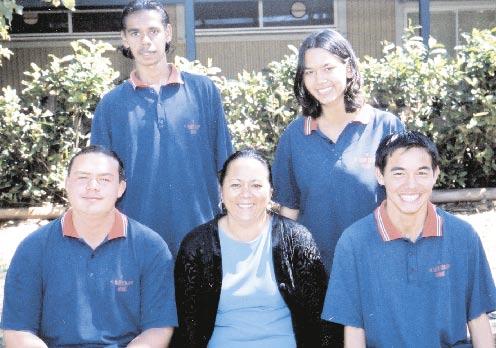
Homesickness was one of them. The exchange program has shown itself to be a success with previous exchange students going on to receive scholarships to continue their studies at Xavier College.
One of these students is now a Doctor practising in the BalgoWirrimanu Community.
The benefits of going on the exchange program for Dale Birch,
were getting to talk to and teach others about his Aboriginal culture. “It has made me a much more confident person,” Dale said.
“I was able to speak to big and small groups as this was something I was never challenged to do before,” he said.
The story was the same for Keiran Hamaguchi. “It has helped
me to see that there is a world outside Broome,” he said.
“Many people in Melbourne don’t have a very good idea or understanding of the Kimberley, where it is situated, let alone know what sort of lifestyle we have.”Mrs White also spoke of the long lasting friendships that are a result of the time spent in Melbourne.
to serve,” he said.
So what do Youth Ministers in the Broome Diocese do, you might ask?
The two young men are involved in everything from mentor programs, to youth choirs, to parish theatre productions and even becoming involved in local government agencies that help youth on the streets.
Based primarily in Broome, Luke said the experience so far has been pretty full on.
“We have a lot going for us – in terms of support in this role,” Luke said.
One experience that Luke remembers well is their first Catholic Youth Camp he and Steve organised during Easter last year.
Having only been in Broome a few months, Luke said all arrangements went well
From fishing, to prayer the camp was aimed at encouraging fine moral and ethical viewpoints.
“It (the camp) was a real eye opener that youth in the diocese were willing to be involved with,”
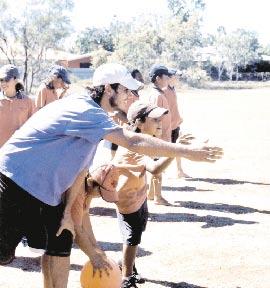
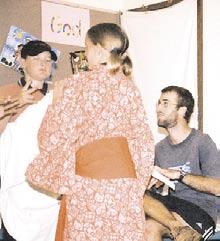
he said. Similar camps are now in place on a monthly basis.
Broome Diocese Bishop Saunders said the personal faith stories of Luke and Steven is what has impressed him.
“They are eager to share what they have received with other people,” he said.
“They are proud of their faith without being too pushy or arrogant.”
Boniwell, from Brisbane, , has had a similar experience to Luke Reynolds.
Having also been on NET teams for two years in Adelaide and
New South Wales, he said his work as a Youth Minister in the Broome Diocese has provided something more than a new experience.
“It has taught me a lot about myself as well,” Steven said.
“And helped me to come out of my comfort zone.”
He came to know about the role as Youth Minister when he met Luke at a Catholic Youth Leadership Camp in 2000.
Throughout the course of his life, Steven has also been involved in Youth Ministry work in Toowoomba, Queensland, and
said he returned home, feeling pretty inspired. “I met people that were excited about God and I wanted to feel the same way,” he said.
Having been in the position now for more than a year, Steven said he feels pleased about what has been achieved so far in Broome.
“We have been able to implement our ideas and the ideas of other people,”
Their present task is centred on a mentoring program for teenage boys at St Mary’s Catholic College who are struggling academically at school.
The Record 16 16 SEPTEMBER 2004
Back left: Dale Birch, and Sharmal Mason 16, with front, left Luke Flynn, also 16, Teacher Liason Vicki White who accompanied the students on the journey to Melbourne and 17-year-old Keiran Hamaguchi. Each one of the students said the program helped them to talk about and understand their Aboriginal culture. Photo Carole McMillen
Left: Luke Reynolds participates in sporting activities with students from St Mary's Catholic College Broome, while Steven Boniwell, right, gets students motivated in an upcoming class re-enactment. The two young men are eager to share their faith with other people.
Photo: Carole McMillen




 Fr Joe Parkinson
Fr Joe Parkinson




































 Wim Wenders
Wim Wenders






 By Jamie O’Brien
By Jamie O’Brien


